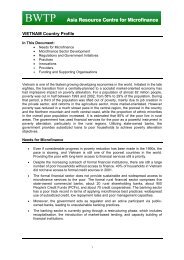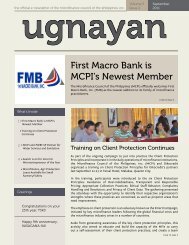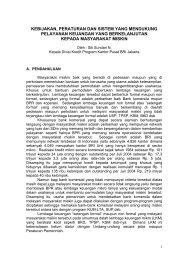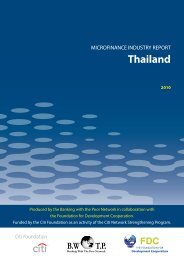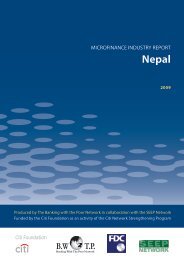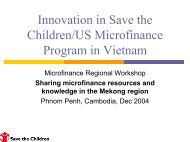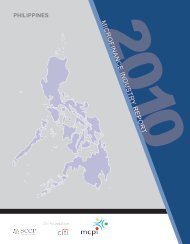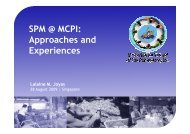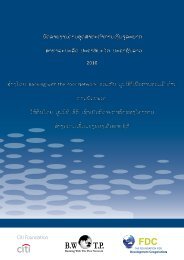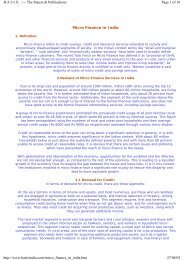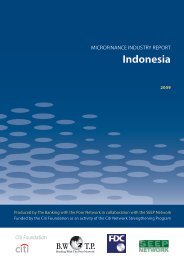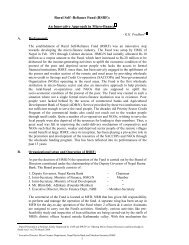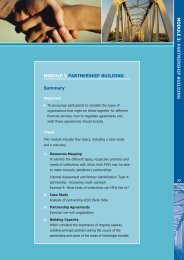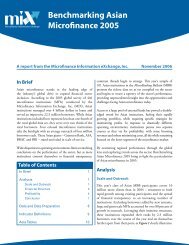Network Snapshot: Microfinance Working Group for the Lao PDR ...
Network Snapshot: Microfinance Working Group for the Lao PDR ...
Network Snapshot: Microfinance Working Group for the Lao PDR ...
You also want an ePaper? Increase the reach of your titles
YUMPU automatically turns print PDFs into web optimized ePapers that Google loves.
<strong>Network</strong> <strong>Snapshot</strong>:<strong>Microfinance</strong> <strong>Working</strong> <strong>Group</strong> <strong>for</strong> <strong>the</strong> <strong>Lao</strong> <strong>PDR</strong>CONTACT INFORMATION<strong>Microfinance</strong> <strong>Working</strong> <strong>Group</strong> <strong>for</strong> <strong>the</strong> <strong>Lao</strong> <strong>PDR</strong> (MFWG) Email: mfwglaopdr@gmail.com113/01 Setthathirath Road, Chanthabouly District, Web: www.mfwglaopdr.orgPO Box 4030Bandith Sisoukda, ChairVientiane Capital (<strong>Lao</strong> <strong>PDR</strong>)Tel/Fax: +856 21 262 979GEOGRAPHIC COVERAGE: <strong>Lao</strong> <strong>PDR</strong> (South East Asia)MEMBERSHIP (December 2011):Total number of members: 36MFIs: 21 (= 62% of <strong>for</strong>mal MFIs in <strong>Lao</strong> <strong>PDR</strong>)Donors/bi- & multilateral organizations/(I)NGOs: 9Business service providers: 6STAGE OF DEVELOPMENT: EmergingESTABLISHMENT: In<strong>for</strong>mally established in May 2007, legal registration as an associationplanned <strong>for</strong> 2012MISSION: To enable <strong>the</strong> microfinance sector in <strong>Lao</strong> <strong>PDR</strong> to provide sustainable, demand-drivenand efficient services to poor and low-income populationsSTRATEGIC OBJECTIVES:Knowledge Management/Research & Representation: MFWG is <strong>the</strong> coordination andin<strong>for</strong>mation plat<strong>for</strong>m <strong>for</strong> <strong>the</strong> industry1. Streng<strong>the</strong>n coordination, collaboration and in<strong>for</strong>mation flow among microfinancestakeholders2. Support ongoing learning and research in <strong>the</strong> microfinance sectorAnnual Report 2011 Page 1
3. Improve sector transparencyAdvocacy: The market environment in <strong>Lao</strong>s is conducive to sector development4. Engage in policy dialogue that encourages an enabling market environment <strong>for</strong>sustainable microfinance that meets international good practice principles; provideinput and feedback to policy makers and/or regulator with regards existing or desiredpolicies that have <strong>the</strong> potential to affect <strong>the</strong> sectorCapacity Building: MFWG members have access to quality microfinance services5. Identify and address common needs in training and technical resource development6. Pool capacity development resources to maximize impact and outreach in movingtowards international good practice principlesMFWG Organizational Development: MFWG is <strong>the</strong> professional microfinance industrynetwork in <strong>Lao</strong>s7. Be a <strong>for</strong>mal network (legally registered entity) with sufficient funding in place to run <strong>the</strong>network sustainably8. Be sufficiently staffed with a professional staff and Board of DirectorsSERVICES: Policy advocacy Capacity Building Knowledge Management/Research & Representation (including Per<strong>for</strong>manceMonitoring)STAFF: 1.5 (Office manager/full time, technical advisor/part time)AFFILIATION WITH INTERNATIONAL NETWORKS: Small Enterprise and Education Promotion (SEEP) Banking with <strong>the</strong> Poor <strong>Network</strong> (BWTP) Social Per<strong>for</strong>mance Task Force (SPTF)FINANCIAL INFORMATION 2010 2011Total Funding US$ 71,995.63 US$ 69,445.95Donor Funding US$ 67,695.63 US$ 64,228.95Main Donors SBFIC, GIZ, ADA, SEEP, BWTP SBFIC, GIZ, ADA, UNCDF, SEEP,BWTPSelf-Generated Income 6% 8%Sources of Self-Generated IncomeMember MFIs and service providercontributionsTraining & administration fees,member MFI contributionsAnnual Report 2011 Page 2
Table of Contents:I. ACRONYMS & ABBREVIATIONS .......................................................................................... 4II. MFWG Board of Directors & Office Manager ...................................................................... 5III. International Donors and Support Agencies ....................................................................... 7IV. Foreword by <strong>the</strong> MFWG Chair ........................................................................................... 8V. MFWG Background .......................................................................................................... 10VI. MFWG Vision, Mission and Core Values .......................................................................... 11VII. Strategic Objectives ....................................................................................................... 12VIII. Governance Structure and Management....................................................................... 14IX. MFWG Activities and Achievements 2011 ........................................................................ 16X. Financial Report ............................................................................................................... 40XI. Conclusions & Outlook <strong>for</strong> 2012 ...................................................................................... 47XII. Annexes......................................................................................................................... 48Annual Report 2011 Page 3
I. ACRONYMS & ABBREVIATIONSAFPANSBOLBWTPDGRVDTMFIFISDKfWIFCILOINGOGIZGOLHRDMAFIPPMCPIMFCMFIMFWGMIXNDTMFINERINGONGPESNSOSCUSEEPSBFICSPTFTOTPACSAPATPPIPWRUNDP/UNCDFAccess to Finance <strong>for</strong> <strong>the</strong> Poor ProjectAsia <strong>Network</strong> SummitBank of <strong>Lao</strong> <strong>PDR</strong>Banking with <strong>the</strong> Poor <strong>Network</strong>German Cooperative and Raiffeisen ConfederationDeposit Taking <strong>Microfinance</strong> InstitutionFinancial Institution Supervision DepartmentKreditanstalt fuer WiederaufbauInternational Finance CorporationInternational Labor OrganizationInternational Non Government OrganizationDeutsche Gesellschaft fuer internationale Zusammenarbeit GmbHGovernment of <strong>Lao</strong> <strong>PDR</strong>Human Resource DevelopmentMaking Access to Finance more Inclusive <strong>for</strong> Poor People<strong>Microfinance</strong> Council of <strong>the</strong> Philippines (National <strong>Microfinance</strong> <strong>Network</strong>)<strong>Microfinance</strong> Center<strong>Microfinance</strong> Institution<strong>Microfinance</strong> <strong>Working</strong> <strong>Group</strong> <strong>for</strong> <strong>the</strong> <strong>Lao</strong> <strong>PDR</strong><strong>Microfinance</strong> In<strong>for</strong>mation ExchangeNon Deposit Taking <strong>Microfinance</strong> InstitutionNational Economic Research InstituteNon Government OrganizationNational Growth and Poverty Eradiation Strategy<strong>Network</strong> Support OrganizationSavings and Credit UnionSmall Enterprise Education and Promotion <strong>Network</strong>Savings Banks Foundation <strong>for</strong> International CooperationSocial Per<strong>for</strong>mance Task ForceTraining of TrainersPublic Administration & Civil Service AuthorityPoverty Assessment ToolProgress out of Poverty Index (Poverty Assessment Tool)Participatory Wealth Ranking (Poverty Assessment Tool)United Nations Development Fund/United Nations Capital Development FundAnnual Report 2011 Page 4
II.MFWG Board of Directors & Office ManagerBandith SisoukdaChairNational <strong>Microfinance</strong> Advisor,GIZ-AFPEmail: : bandith.sisoukda@giz.deSaysamone KouanmeunangchanhVice-ChairDirector, Saynhai SamphanhDTMFIEmail:saysamone_ssdtmfi@yahoo.comSomchit BounleumeTreasurerDirector, DMID DTMFIEmail: somchit_dmi@hotmail.comSomchith DuangmexaySecretaryManager, OudomxayDevelopment NDTMFIEmail:microfinance_odx@yahoo.comChantha MingbouphaBoard MemberAnnual Report 2011 Page 5
Deputy Director, EMI DTMFIEmail: chanthabp@yahoo.comViengnakhone LovanxayMFWG Office ManagerEmail:vlovanxay@yahoo.com113/01 Setthathirath RoadVientiane Capital , <strong>Lao</strong> <strong>PDR</strong>Office Hours: Mondays-Fridays,8-12am, 1-5pmOffice Telephone & Fax:+856 201 262 979Email: mfwglaopdr@gmail.comWeb: www.mfwglaopdr.orgAnnual Report 2011 Page 6
III.International Donors and Support AgenciesWe would like to thank our donors and support agencies <strong>for</strong> <strong>the</strong>ir technical and financialsupport in 2011.Annual Report 2011 Page 7
IV.Foreword by <strong>the</strong> MFWG Chair2011 has been a very productive year <strong>for</strong> <strong>the</strong> MFWG. We were able to establish ourpermanent office, employed a full-time office manager to engage in <strong>the</strong> day-to-day businessof <strong>the</strong> network and prepared <strong>the</strong> ground <strong>for</strong> establishing <strong>the</strong> network as a legal entity with<strong>the</strong> Ministry of Home Affairs (association registration). Thanks to active marketing ef<strong>for</strong>tswe were able to increase our member base to 36 members (which represents 62% of <strong>the</strong><strong>for</strong>mal microfinance sector in <strong>Lao</strong>s). A sound governance system <strong>for</strong> <strong>the</strong> network wasestablished by creating by-laws, an internal control and reporting system as well asconducting <strong>the</strong> first financial audit <strong>for</strong> <strong>the</strong> year ending 31 December 2011.Regular (bi-monthly) member and Board meetings were held to present sector relevanttopics on a demand basis and discuss MFWG progress and challenges. Moreover, followinga strategic planning workshop in July, <strong>the</strong> MFWG prepared and finalized its draft strategicand business plan <strong>for</strong> <strong>the</strong> period 2012-2014 and thus has outlined a roadmap <strong>for</strong> <strong>the</strong>development of <strong>the</strong> network and its strategic objectives <strong>for</strong> <strong>the</strong> next three years to come.A comprehensive mapping exercise of <strong>for</strong>mal MFIs and microfinance programs wasundertaken and added to <strong>the</strong> newly established bi-lingual website. The new website wasfinally launched in December and contains a vast amount of data <strong>for</strong> <strong>the</strong> sector which aimsat improving sector transparency, cooperation and coordination of sector activities.Moreover, we set up a ‘Human Resource Development Task Committee’ and have offeredmuch needed and high quality training <strong>for</strong> microfinance practitioners. Simultaneously, wepursued our ongoing advocacy ef<strong>for</strong>ts and provided <strong>the</strong> Bank of <strong>Lao</strong> <strong>PDR</strong> (FinancialInstitutions Supervision Department) with valuable feedback regarding <strong>the</strong> draft<strong>Microfinance</strong> Decree and raised awareness about identified issues which are negativelyaffecting sector development.2012 will be an important year <strong>for</strong> <strong>the</strong> microfinance sector as we await <strong>the</strong> promulgation of<strong>the</strong> <strong>Microfinance</strong> Decree which will <strong>for</strong> <strong>the</strong> first time in <strong>Lao</strong> <strong>PDR</strong> allow minority <strong>for</strong>eigninvestment <strong>for</strong> MFIs. We hope that this will help <strong>the</strong> sector to grow but we need to ensurethat MFIs are well prepared and equipped <strong>for</strong> this change to happen and <strong>the</strong> MFWGcertainly has to play a crucial role in <strong>the</strong> process. The capacity building and training needs ofMFI staff and Boards continue to be huge which cannot be addressed by MFWG alone.MFWG will increase its capacity building and training activities to help addressing <strong>the</strong>seneeds but more concerted ef<strong>for</strong>ts are needed to support MFIs in gradually increasing <strong>the</strong>ircapacity and expertise to effectively manage microfinance operations.In addition, we hope that in <strong>the</strong> coming year we can continue our ef<strong>for</strong>ts to fur<strong>the</strong>r increasesector transparency by introducing (social and financial) per<strong>for</strong>mance data monitoring andbenchmarks <strong>for</strong> <strong>Lao</strong> MFIs and creating a semi-annual newsletter with relevant sectorin<strong>for</strong>mation. MFIs need to focus on improving <strong>the</strong>ir social per<strong>for</strong>mance to avoid missiondrift and multiple borrowing of clients. Outreach to <strong>the</strong> poor needs to be fur<strong>the</strong>r enhancedby creating appropriate products <strong>for</strong> poor clients living in rural areas. The MFWG willAnnual Report 2011 Page 8
support this by organizing a market research & product development training and also byconducting social audits <strong>for</strong> MFIs.Also, we will continue our ef<strong>for</strong>ts to become a <strong>for</strong>mal entity by <strong>the</strong> end of this year(temporary association license) which will allow us to fur<strong>the</strong>r expand our products andservices offered to our members. We will also introduce member fees and charge trainingfees to be able to gradually reduce donor dependency and cover an increasing percentageof our operating expenses by self-generated income.In order to be able to achieve our goals set <strong>for</strong> 2012 we need to recruit additional staff andwe hope to be able to fill <strong>the</strong> position of a General Director <strong>for</strong> <strong>the</strong> network to enable <strong>the</strong>MFWG to sustainably run and expand its operations.On behalf of <strong>the</strong> MFWG Board I would like to thank all our members, donors/internationalagencies, relevant Government of <strong>Lao</strong> <strong>PDR</strong> Authorities and staff <strong>for</strong> <strong>the</strong>ir (technical and/orfinancial) support over <strong>the</strong> year. We hope to be able to fur<strong>the</strong>r expand our outreach andsupport structure in 2012 to pursue our goal to ‘enable <strong>the</strong> microfinance sector in <strong>Lao</strong> <strong>PDR</strong>to provide sustainable, demand-driven, efficient services to poor and low incomepopulations in <strong>Lao</strong> <strong>PDR</strong>’.________________________________________Bandith SisoukdaMFWG ChairAnnual Report 2011 Page 9
VI.MFWG BackgroundThe <strong>Microfinance</strong> <strong>Working</strong> <strong>Group</strong> <strong>for</strong> <strong>the</strong> <strong>Lao</strong> <strong>PDR</strong> (MFWG) is <strong>the</strong> national microfinance industrynetwork and was established in May 2007. It aims at bringing toge<strong>the</strong>r microfinancepractitioners and o<strong>the</strong>r relevant stakeholders to share experience and in<strong>for</strong>mation about <strong>the</strong>sector with <strong>the</strong> goal to improve sector coordination, transparency, sustainability and quality ofmicrofinance services. Its services focus on three core areas: knowledge management/research& representation, capacity building and advocacy.The MFWG’s mandate is embedded in and supports <strong>the</strong> poverty alleviation ef<strong>for</strong>ts of <strong>the</strong>Government of <strong>the</strong> <strong>Lao</strong> <strong>PDR</strong>, in particular those outlined in <strong>the</strong> National Growth and PovertyEradication Strategy (NGPES) 1 which include movement towards a market oriented economy,financial sector re<strong>for</strong>m specifically of microfinance providers, client-driven microfinance servicedevelopment, MFI autonomy including that of interest rate setting, legal space <strong>for</strong> sustainablemicrofinance institutions and last but not least ‘<strong>the</strong> creation of a microfinance <strong>for</strong>um’.MFWG members presently comprise regulated microfinance institutions (DTMFIs, NDTMFIs,SCUs and <strong>Network</strong> Support Organizations) as well as donors, bi/multi-lateral agencies, INGOs,service providers and resource persons working in microfinance. The network is a member ofreputed regional and global networks (such as SEEP, BWTP and SPTF) to ensure exposure toglobal microfinance trends & developments and international sector representation.Since January 2011 <strong>the</strong> MFWG has a secretariat and full-time staff. As a young, emergingnational microfinance network it now strives to become a <strong>for</strong>malized, professional andsustainable organization capable to permanently represent <strong>the</strong> industry interests andresponding to its needs.1 Government of <strong>Lao</strong> <strong>PDR</strong>, ‘National Growth and Poverty Eradication Strategy (NGPES)’, 2003. The NGPES providesa long-term strategy <strong>for</strong> poverty reduction in <strong>Lao</strong> <strong>PDR</strong> until 2020.Annual Report 2011 Page 10
VII.MFWG Vision, Mission and Core ValuesVISION: ’To be <strong>the</strong> representativebody <strong>for</strong> <strong>the</strong> microfinance industry in<strong>Lao</strong> <strong>PDR</strong>’MISSION: ’To enable <strong>the</strong> microfinancesector to provide sustainable, demanddriven,efficient services to poor andlow income populations’Core Values of MFWG:InclusionMFWG respects & engages allmicrofinance stakeholders in<strong>Lao</strong>s & places high value on <strong>the</strong>diversity of experiencerepresented in <strong>the</strong> sectorCommitmentMembers assign & devote<strong>the</strong>mselves to actively engage inachieving <strong>the</strong> vision & mission of<strong>the</strong> MFWGAccountabilityThe MFWG takesresponsibility <strong>for</strong> itsdecisions and activitiesTransparencyThe MFWG strives <strong>for</strong> fulltransparency in its operationsand services. It is open andhonest about its experiences anddiscloses and shares in<strong>for</strong>mationwith its members & stakeholdersSocial OrientationThe MFWG places highvalue on <strong>the</strong> interests, wellbeingand needs of poor andlow-income populations in<strong>Lao</strong> <strong>PDR</strong>Annual Report 2011 Page 11
VIII. STRATEGIC OBJECTIVES:a) Knowledge Management/Research & Representation:‘MFWG is <strong>the</strong> coordination and in<strong>for</strong>mation plat<strong>for</strong>m <strong>for</strong> <strong>the</strong> industry’1. Streng<strong>the</strong>n coordination,collaboration and in<strong>for</strong>mation flowamong microfinance stakeholders2. Support ongoing learning andresearch in <strong>the</strong> microfinance sector3. Improve sector transparencyb) Advocacy: ‘The market environment in <strong>Lao</strong>s s conducive to sector development’1. Engage in policy dialogue thatencourages an enabling marketenvironment <strong>for</strong> sustainablemicrofinance that meetsinternational good practiceprinciples; provide input andfeedback to policy makers and/orregulators with regards <strong>the</strong> existingor desired policies that have <strong>the</strong>potential to affect <strong>the</strong> sectorAnnual Report 2011 Page 12
c) Capacity Building: ‘MFWG members have access to quality microfinance services’1. Identify and address common needsin training and technical resourcedevelopment2. Pool capacity developmentresources to maximize impact andoutreach in moving towardsinternational good practiceprinciplesd) MFWG Organizational Development: ‘MFWG is <strong>the</strong> professional microfinance industrynetwork in <strong>Lao</strong>s’1. Be a <strong>for</strong>mal network (legallyregistered entity) with sufficientfunding in place to run <strong>the</strong> networksustainably2. Be sufficiently staffed withprofessional staff and Board ofDirectorsAnnual Report 2011 Page 13
IX. Governance Structure and ManagementThe General Assembly is <strong>the</strong> supreme authority and decision making body of <strong>the</strong> network.The assembly is held annually and comprises all members. It reviews and approves <strong>the</strong>annual report established by <strong>the</strong> Executive Office on <strong>the</strong> affairs and activities of <strong>the</strong>network, <strong>the</strong> previous year’s accounts and <strong>the</strong> business and operational plan <strong>for</strong> <strong>the</strong> year,and elects <strong>the</strong> Board of Directors in accordance with its by-laws.The Board consists of minimum five members who have to be members of <strong>the</strong> MFWG. TheChairperson of <strong>the</strong> Board is <strong>the</strong> legal representative of <strong>the</strong> network and represents <strong>the</strong>network internally and externally. He chairs <strong>the</strong> General Assembly, member meetings and<strong>the</strong> Board meetings and ensures that <strong>the</strong> operations stay on track. The Board Directors areresponsible <strong>for</strong> <strong>the</strong> overall direction, strategy and control of <strong>the</strong> management of <strong>the</strong>network and <strong>the</strong> <strong>for</strong>mulation of policies to be applied in <strong>the</strong> conduct of <strong>the</strong> business.The Board of Directors may appoint specific Task Committees as may be deemed necessaryin <strong>the</strong> implementation of <strong>the</strong> purposes, programs and activities of <strong>the</strong> network. In 2011, <strong>the</strong>network established its first task committee, <strong>the</strong> Human Resource Development TaskCommittee which is in charge of streng<strong>the</strong>ning human resource capacity of <strong>the</strong> sector.It is planned to create two more task committees in 2012: An advisory committeecomprising representatives of main donors and international agencies working inmicrofinance in <strong>Lao</strong> <strong>PDR</strong> and a policy committee to follow up on progress related to sectorpolicies and regulations.The Executive Office is a permanent support organ of <strong>the</strong> network providing support to <strong>the</strong>Board in <strong>the</strong> management and administration of network’s activities.Staff per<strong>for</strong>mance is assessed against <strong>the</strong>ir terms of reference on an annual basis. Presently,<strong>the</strong> MFWG has one full-time staff (office manager) to handle all administrative and financialtasks of <strong>the</strong> network in close cooperation with <strong>the</strong> Board of MFWG.Please also refer to <strong>the</strong> diagram on <strong>the</strong> next page <strong>for</strong> <strong>the</strong> organizational structure of <strong>the</strong>network:Annual Report 2011 Page 14
Organizational Chart<strong>Microfinance</strong> <strong>Working</strong> <strong>Group</strong> <strong>for</strong> <strong>the</strong> <strong>Lao</strong> <strong>PDR</strong>General Assembly(All Members)Board of Directors(minimum 5 Members)Task Committee(e.g. Human Resource Dvpt)Task Committee(e.g. Advisory)Executive OfficeTask Committee(e.g. Policy)(Permanent Secretariat – General Director, Office Manager, o<strong>the</strong>r Staff)Office Operations:• Membership• Public Relations• Accounting• Administration• Donor LiaisonMember Services:• Capacity Building/Training• Advocacy• Knowledge Management &Research/Surveys• RepresentationMembersAnnual Report 2011 Page 15
X. MFWG Activities and Achievements 2011IX.1. Knowledge Management/Research & Representation MFWG in partnership with GIZ-AFP conducted an audit survey with <strong>Lao</strong> MFIs(January)GIZ-AFP has, with <strong>the</strong> support of MFWG, researched <strong>the</strong> state of practice with regards toexternal audits <strong>for</strong> MFIs and SCUs in <strong>Lao</strong> <strong>PDR</strong> as audits <strong>for</strong>m a key component <strong>for</strong> sectordevelopment.A total of 28 organizations (which comprised 32% DTMFIs, 40% SCUs and 28% NDTMFIs)were interviewed of which 54% had been audited. Of <strong>the</strong> audited organizations, 87% saidthat <strong>the</strong>y observed an improvement following <strong>the</strong> audit (i.e. with regards <strong>the</strong>ir accountingsystems & operations, security, credit systems, cash & depreciation control, management,better expenditure control).From <strong>the</strong> total MFIs/SCUs questioned, 46 % had not been audited because <strong>the</strong>y were ei<strong>the</strong>rnewly established, and hence not developed enough <strong>for</strong> an audit, or <strong>the</strong>y would like toconduct an internal audit first. O<strong>the</strong>r reasons were that <strong>the</strong>y lack funds to pay <strong>for</strong> an audit,<strong>the</strong>y understood that <strong>the</strong> MFIs only need to be audited after 3 years of operations and/orbecause <strong>the</strong> MFI was not aware of <strong>the</strong> audit requirement. O<strong>the</strong>rs understood that BoLwould conduct <strong>the</strong> external audit <strong>for</strong> <strong>the</strong>m which indicates that MFIs think that <strong>the</strong> BoLsupervisory examination which is conducted once a year is <strong>the</strong> same as an external audit.The auditing services to MFIs/SCUs were provided by eight Vientiane based auditing firms: AP – Amphone Accounting Service, Vientiane ASC – Accounting Service Company, Vientiane Auditing Service Expanya, Vientiane Chanthavong & ROCS Company Ltd., Vientiane LanXang Accounting Service, Vientiane Triple A Company Limited, Vientiane KPMG, Vientiane Price Waterhouse Cooper, VientianeThe cost <strong>for</strong> an audit ranged between US$125 – US$6,000 per MFI/SCU. Two Co-Chairs attend 1 st Social Per<strong>for</strong>mance Asia <strong>Working</strong> <strong>Group</strong> meeting inBangkok (February/March)The two Co-Chairs of <strong>the</strong> MFWG participated in <strong>the</strong> 1 st Social Per<strong>for</strong>mance Asia <strong>Working</strong><strong>Group</strong> Meeting which took place in Bangkok from 28 February – 2 March with support fromSEEP and PLAN Asia. It brought toge<strong>the</strong>r ten networks from Asia and o<strong>the</strong>r interestedstakeholders like Planet Finance, MicroFinanza Rating and Microsave. The first day wasorganized as an orientation of social per<strong>for</strong>mance whereas <strong>the</strong> next two days werededicated to discussing <strong>the</strong> role of <strong>the</strong> group going <strong>for</strong>ward and developing a strategy <strong>for</strong><strong>the</strong> next three years. The MFWG joined <strong>the</strong> Social Per<strong>for</strong>mance Task Force (SPTF) as amember in October 2010. The SPTF Asia <strong>Working</strong> <strong>Group</strong> was <strong>for</strong>med in 2009 during a SPTFannual meeting in Madrid as one of <strong>the</strong> sub-groups of <strong>the</strong> SEEP associations working group.Annual Report 2011 Page 16
The objective is to catalyze work on social per<strong>for</strong>mance and improve coordination amongstnetworks at <strong>the</strong> regional level.MFWG Co-Chairs Bandith Sisoukda and Ursula Hammerich attend <strong>the</strong>‘1 st Social Per<strong>for</strong>mance Asia <strong>Working</strong> <strong>Group</strong> Meeting’ in Bangkok from 28 February – 2 March 2011 Social Per<strong>for</strong>mance Management Survey conducted & Thesis on ‘Role of MFWG inSocial Per<strong>for</strong>mance’ finalized (June-September)Julien Jacquet, who worked as a MFWG intern in Vientiane from mid-June – August 2011,wrote a Master Thesis on ‘The Role of <strong>Microfinance</strong> <strong>Network</strong>s in Social Per<strong>for</strong>mance – TheCase of <strong>the</strong> <strong>Microfinance</strong> <strong>Working</strong> <strong>Group</strong> <strong>for</strong> <strong>the</strong> <strong>Lao</strong> <strong>PDR</strong>’ (September 2011) under <strong>the</strong>supervision of Professor Cecile Lapenu (European <strong>Microfinance</strong> Program 2010-2011) and <strong>the</strong>MFWG advisor. The <strong>the</strong>sis investigates <strong>the</strong> role of an emerging microfinance network likeMFWG in establishing a strategy to improve social per<strong>for</strong>mance of MFIs. <strong>Network</strong>srepresent ‘an excellent entry <strong>for</strong> social per<strong>for</strong>mance, thanks to <strong>the</strong>ir ability to raiseawareness among members and key stakeholders. <strong>Network</strong>s are also well-positioned toadvance <strong>the</strong> implementation of social per<strong>for</strong>mance in a way that reflects local context andmembers’ needs, through training, capacity building, pilot-testing and peer learning.’ 2 The<strong>the</strong>sis used an adapted version of <strong>the</strong> CERISE SPI questionnaire <strong>for</strong> MFI data collection and16 MFIs participated in <strong>the</strong> survey and submitted <strong>the</strong>ir data. The data was subsequentlyconsolidated, analyzed and used as basis <strong>for</strong> <strong>the</strong> development of a social per<strong>for</strong>mancestrategy. The decision tree developed by Imp-Act Consortium and <strong>the</strong> CERISE <strong>Network</strong> wasused as a tool to establish this strategy.The intern also prepared a presentation of main findings which were shared with MFWGmembers during its members’ meeting on 3 October 2011. Key results and challenges toaddress in <strong>the</strong> future include a lack of focus of MFIs on poor and rural clients and a lack ofproducts and services well adapted to <strong>the</strong> needs of <strong>the</strong>se clients. Very few MFIs trackpoverty levels over time (poverty assessments) and <strong>the</strong> majority of participating MFIs (62%)identify multiple-borrowings and over-indebtedness of clients to be an issue. Key findingsand recommendations from <strong>the</strong> study were also used as a basis <strong>for</strong> <strong>the</strong> development of <strong>the</strong>content <strong>for</strong> <strong>the</strong> Social Per<strong>for</strong>mance Management Training of Trainers which was conductedin August 2011 (see under IX.2.Capacity Building).2 Eva Bankowska et al., ’The Decision Tree <strong>for</strong> <strong>Microfinance</strong> <strong>Network</strong>s. Empowering <strong>Network</strong>s to Develop aSocial Per<strong>for</strong>mance Strategy, CERISE and <strong>the</strong> Imp-Act Consortium represented by <strong>the</strong> <strong>Microfinance</strong> Centre’,2011, p.5Annual Report 2011 Page 17
MFWG participates in <strong>the</strong> Annual Conference of <strong>the</strong> Social Per<strong>for</strong>mance Task Forcein Den Bosch/Holland (June)The MFWG advisor attended <strong>the</strong> SPTF Annual Conference in Den Bosch/Holland from 19-23June. The meeting focused on how to move <strong>the</strong> social per<strong>for</strong>mance agenda <strong>for</strong>ward andgiven <strong>the</strong> key role networks play in doing so, <strong>the</strong>re were two days <strong>for</strong> <strong>the</strong> SPTF Associations<strong>Working</strong> <strong>Group</strong> to meet (a pre- and post-meeting on 20 th and 23 rd June). The MFWGcollected relevant in<strong>for</strong>mation on social per<strong>for</strong>mance management, such as universalstandards, various campaigns and initiatives, MIX reporting on social reporting, etc. withrelevance to <strong>the</strong> <strong>Lao</strong> microfinance sector. In addition, <strong>the</strong>re were side events and meetings(i.e. social investors meeting, IMP-ACT consortium, SMART Campaign and SocialPer<strong>for</strong>mance Management <strong>Working</strong> <strong>Group</strong>) to deepen <strong>the</strong> understanding of various actorsinvolved in social per<strong>for</strong>mance and <strong>the</strong>ir initiatives. Six <strong>Lao</strong> MFIs submit <strong>the</strong>ir comments and feedback regarding <strong>the</strong> UniversalStandards of Social Per<strong>for</strong>mance to <strong>the</strong> Social Per<strong>for</strong>mance Task Force(October/November)The SPTF Universal Standards <strong>for</strong> Social Per<strong>for</strong>mance Management are a set of standardswhich specify MFI social per<strong>for</strong>mance in relation to <strong>the</strong> following areas: Social goals andtarget clients, governance and employee commitment to social goals, protecting clientrights, products and services that meet clients’ needs, social responsibility to employees,client monitoring, and responsible financial per<strong>for</strong>mance. Following <strong>the</strong> discussion on <strong>the</strong>development of Universal Standards of Social Per<strong>for</strong>mance during <strong>the</strong> SPTF Annual Meetingin June (which also highlighted <strong>the</strong> important role of networks in promoting <strong>the</strong> use of socialper<strong>for</strong>mance standards among MFIs), <strong>the</strong> MFWG was requested to administer feedbackfrom <strong>Lao</strong> MFIs about <strong>the</strong> draft social per<strong>for</strong>mance standards which had been established byvarious stakeholders from around <strong>the</strong> world. The participating MFIs from <strong>Lao</strong>s whosubmitted <strong>the</strong>ir responses were: EMI, Xaniyom NDTMFI, Oudomxay Development NDTMFI,Saynhai Samphanh DTMFI, IFDP Phongsaly NDTMFI, DMI DTMFI. These MFIs had alsoparticipated in <strong>the</strong> Social Per<strong>for</strong>mance Training of Trainers (see under ‘IX.2. CapacityBuilding’ below) and thus had already been sensitized towards <strong>the</strong> topic. The MFWGmanagement team consolidated <strong>the</strong>ir comments and submitted <strong>the</strong>m to <strong>the</strong> SPTF on 1November 2011 <strong>for</strong> consideration and inclusion in <strong>the</strong> final standards which will bediscussed during <strong>the</strong> next Annual Meeting of <strong>the</strong> SPTF in Jordan in June 2012. Per<strong>for</strong>mance indicators <strong>for</strong> MFIs established and approved by members (May)During its member meeting on 20 May, a brief overview on <strong>the</strong> importance of improvingsector transparency and <strong>the</strong> benefits of introducing internationally acknowledgedper<strong>for</strong>mance indicators <strong>for</strong> MFIs members was discussed. The benefits of per<strong>for</strong>mancereporting are evident as management indicators guide MFIs to monitor key aspects ofbusiness and help guide MFI’s management decisions. Moreover, indicators help MFIs and<strong>the</strong> sector as a whole to set up standards and measure <strong>the</strong> impact of <strong>the</strong>ir work. It wasagreed during <strong>the</strong> meeting that MFIs would report against <strong>the</strong> following per<strong>for</strong>manceindicators:• Number of total active clients• % of active female clients• Number of urban/rural clientsAnnual Report 2011 Page 18
• Number clients from ethnic groups• Number of active borrowers (female and male)• % <strong>Group</strong> borrowers• % Individual borrowers• Number of compulsory savers• Number of voluntary savers• Number of branches & service units• Number of villages• Number of staff• Number of credit officers• Gross loan portfolio (LAK)• <strong>Group</strong>/Individual loan portfolio (LAK)• Total assets• Total equity• Average disbursed loan size (LAK)• Portfolio at risk >30 days+• Number of loans outstanding per credit officer• Operational Self Sustainability (OSS)Public disclosure on internationally recognized standards will improve <strong>the</strong> reputation andcredibility of MFIs in <strong>the</strong> sector and with relevant stakeholders (e.g. donors, investors,banks, Government of <strong>Lao</strong> <strong>PDR</strong>, Bank of <strong>Lao</strong> <strong>PDR</strong>, etc.). It will also help to increase sectortransparency and accountability at industry level as well as access to debt and/or equityfunding (<strong>the</strong> latter will become important once <strong>the</strong> <strong>Lao</strong> <strong>Microfinance</strong> Decree has beenapproved). Lack of access to per<strong>for</strong>mance data of <strong>Lao</strong> MFIs has been identified as one of <strong>the</strong>key constraints of sector development by stakeholders and this activity aims at addressingthis challenge.Moreover, MFWG plans to consolidate <strong>the</strong> data and publish it on its new website (startingquarter 1 2012) and to use <strong>the</strong> data to establish benchmarks <strong>for</strong> <strong>the</strong> sector as a whole and<strong>for</strong> peer groups (i.e. SCUs, DTMFIs, NDTMFIs) to be able to compare per<strong>for</strong>mance andprogress against benchmarks over time. This will allow comparisons of MFIs at similarmaturity levels. Once a critical mass of MFIs has submitted <strong>the</strong>ir per<strong>for</strong>mance data, <strong>the</strong>MFWG plans to provide feedback to <strong>the</strong> MFIs on <strong>the</strong>ir per<strong>for</strong>mance against averages. Thedata can also be used to improve sector planning and coordination as well as to identifyrequired technical assistance to fur<strong>the</strong>r streng<strong>the</strong>n <strong>the</strong> per<strong>for</strong>mance of MFIs in <strong>Lao</strong> <strong>PDR</strong>. Lastbut not least per<strong>for</strong>mance monitoring and national benchmarks are important as <strong>the</strong>y canbe used to compare <strong>Lao</strong> per<strong>for</strong>mance with international per<strong>for</strong>mance averages. It was alsomentioned that MFIs can fur<strong>the</strong>r increase transparency by posting <strong>the</strong>ir data on <strong>the</strong> MIXMarket (<strong>Microfinance</strong> In<strong>for</strong>mation Exchange: www.mixmarket.org). For example SaynhaiSamphan DTMFI, IFDP Phongsaly NDTMFI and EMI are already listed on <strong>the</strong> MIX. MFWGencourages more MFIs to follow <strong>the</strong>ir example. Participation in Asia <strong>Network</strong> Summit in Manila/Philippines (July)Two MFWG Board of Directors, <strong>the</strong> office manager and advisor attended <strong>the</strong> Asia <strong>Network</strong>Summit (ANS) from 26-27 July in Manila/Philippines. The conference was organized by <strong>the</strong>Banking with <strong>the</strong> Poor <strong>Network</strong> (BWTP) of which <strong>the</strong> MFWG is a member since 2010. TheBWTP <strong>Network</strong> is <strong>the</strong> regional network of microfinance associations in Asia. The <strong>Lao</strong>Annual Report 2011 Page 19
network representatives participated in sessions on product and service innovation,consumer protection and risk management, managing donor relationships/partnerships aswell as in developing a regional network collaboration strategy. By participating in <strong>the</strong> ANS<strong>the</strong> MFWG was able to update <strong>the</strong> regional network about MFWG progress and challengesand get to know and share relevant experiences with <strong>the</strong> o<strong>the</strong>r national networks in Asia.MFWG Board Secretary Somchit Douangmixay, Treasurer Somchit Bounleum, Office Manager Viengnakhone Lovanxay andAdvisor Ursula Hammerich attend <strong>the</strong> ‘Asia <strong>Network</strong> Summit’ in Manila from 26-27 July 2011 MFWG participation in Annual Conference of <strong>the</strong> <strong>Microfinance</strong> Council of <strong>the</strong>Philippines (MCPI) in Manila/Philippines (July)Directly after <strong>the</strong> ANS, <strong>the</strong> <strong>Lao</strong> delegation also participated in <strong>the</strong> Annual Conference of <strong>the</strong><strong>Microfinance</strong> Council of <strong>the</strong> Philippines (MCPI) in Manila (28-29 July), which is <strong>the</strong>microfinance network of <strong>the</strong> Philippines. In <strong>the</strong> two days workshop more than 200practitioners and network members discussed various pressing industry related topics, suchas responsible finance, multiple borrowing, pricing & transparency. The conference was agood learning opportunity <strong>for</strong> <strong>the</strong> <strong>Lao</strong> delegation to see how similar events could beorganized in <strong>the</strong> future in <strong>Lao</strong> <strong>PDR</strong> as well. Mapping data of major microfinance projects and member microfinancepractitioners (July-November)The MWG management team prepared a member profile questionnaire <strong>for</strong> MFIs and Non-MFIs and submitted it to all members with <strong>the</strong> request to submit <strong>the</strong>ir organizational data to<strong>the</strong> MFWG. 21 MFIs and 12 international agencies submitted <strong>the</strong>ir data and <strong>the</strong> MFWGreviewed and added <strong>the</strong> data to a matrix consolidating all project and MFI in<strong>for</strong>mation. Thematrixes, which contain amongst o<strong>the</strong>rs in<strong>for</strong>mation on <strong>the</strong> organization’s mission, targetgroups, products and services, lending methodology and geographical focus, weresubsequently added to <strong>the</strong> new MFWG website with <strong>the</strong> objective to increase sectortransparency and stakeholder coordination and planning. For more in<strong>for</strong>mation please see:www.mfwglaopdr.org/media/eng/Mappingof<strong>Microfinance</strong>Practitioners.pdfwww.mfwglaopdr.org/ media/eng/Mappingof<strong>Microfinance</strong> Projects.pdf Briefing paper on ‘Institutional Development Per<strong>for</strong>mance of MFIs in <strong>Lao</strong> <strong>PDR</strong> 2008-2010’ (September)A briefing paper on ‘Institutional Development Per<strong>for</strong>mance of MFIs in <strong>Lao</strong> <strong>PDR</strong> 2008-2010’was prepared by Shane Nichols, <strong>for</strong>mer Team Leader of <strong>the</strong> BOL-ADB funded ‘Catalyzing<strong>Microfinance</strong> <strong>for</strong> <strong>the</strong> Poor Project’ based on <strong>the</strong> findings from a survey undertaken underAnnual Report 2011 Page 20
participate in sessions and events designed specifically to address key issues facingassociations today. Mr Sisoukda was granted a scholarship to attend <strong>the</strong> event and was alsopanelist in <strong>the</strong> workshop on ‘Audit & Governance: Use of Director’s Internal Audit Guide’. Healso actively engaged in <strong>the</strong> ‘Social Per<strong>for</strong>mance <strong>Working</strong> <strong>Group</strong>’ meeting which wasorganized as one of <strong>the</strong> side events of <strong>the</strong> conference. The 4-days summit also offeredworkshops on multiple topics such as financial education, client protection, youth financialservices, microenterprise development, new developments in product and serviceinnovation, responsible finance, mitigation of industry risks and new frontiers in associationdevelopment.MFWG Chair Bandith Sisoukda participated in <strong>the</strong> ‘12 th SEEP Global <strong>Network</strong> Summit’ in Arlington, VA/USAfrom 31 October - 3 November 2011 SBFIC Board of Trustees from Germany visits MFWG (October)On 31 October <strong>the</strong> SBFIC Board of Trustees from Germany visited <strong>the</strong> office of MFWG toreceive an introduction to <strong>the</strong> development of <strong>the</strong> microfinance sector in <strong>Lao</strong> <strong>PDR</strong> and anoverview of <strong>the</strong> MFWG strategic plan, its services offered and future activities.SBFIC Board of Trustees from Germany visited <strong>the</strong> MFWG on 31 October in Vientiane
The delegation comprised 15 high level savings bank representatives from different regionsof Germany who travelled <strong>Lao</strong>s and Vietnam to visit partner organizations of <strong>the</strong> SBFIC’sregional microfinance program. The program comprises partners in <strong>Lao</strong>s, Vietnam andCambodia. SBFIC supports four partner institutions in <strong>Lao</strong> <strong>PDR</strong> alone, namely MFWG, WFDF,EMI and MFC. MFWG Vice-Chair and advisor attended SBFIC Regional <strong>Microfinance</strong> Conference inLuang Prabang with program partners from Vietnam, Cambodia and <strong>Lao</strong>s(November)The annual conference of <strong>the</strong> SBFIC’s regional microfinance conference took place in LuangPrabang from 3-4 November and was attended by 23 program partners from Vietnam,Cambodia, <strong>Lao</strong>s and <strong>the</strong> Philippines. This annual conference is organized by SBFIC <strong>for</strong> directregional project partners only and <strong>the</strong> MFWG was represented by its Vice Chair and <strong>the</strong>SBFIC advisor. The annual event‘s main objective is to ga<strong>the</strong>r program partners to createsynergies, share expertise and best practices from <strong>the</strong> region among program partners. Thefocus topic of this year’s workshop was dedicated to <strong>the</strong>: ‘Importance of Savings’. Theparticipants were grouped in two different workshops in <strong>the</strong> afternoon session of <strong>the</strong>conference: 1. Market research, target groups, demand-driven savings products andtechnologies, marketing and 2. Financial aspects (low operating and transaction costs,efficient delivery/distribution channels). In each workshop <strong>the</strong> partners developed a list ofthings to consider and to avoid when developing savings products and <strong>the</strong> findings wereshared with all participants. Based on <strong>the</strong> findings from <strong>the</strong> presentations each partnerinstitution was requested to develop its own savings mobilisation strategy (including <strong>the</strong>possible implementation of lottery savings if feasible in <strong>the</strong> given country context) and tohold discussions regarding this strategy in quarter 1 2012. SBFIC will send a short termexpert to <strong>Lao</strong>s to provide follow-up support on <strong>the</strong> topic in 2012.SBFIC Regional Project Partners from <strong>Lao</strong>s, Vietnam, Cambodia and <strong>the</strong> Philippines(including MFWG representatives and members) ga<strong>the</strong>r in Luang Prabang<strong>for</strong> <strong>the</strong> ‘Annual Regional <strong>Microfinance</strong> Conference’ (3-4 November)Annual Report 2011 Page 23
MFWG <strong>for</strong>mally launched new MFWG bi-lingual website (<strong>Lao</strong> and English)(December)On 5 th December 2011 <strong>the</strong> MFWG officially launched its new bi-lingual (English & <strong>Lao</strong>)website (www.mfwglaopdr.com). This new site which was designed by MFWG with supportfrom X-Eye firm and GIZ-AFP intern Patrizia Matzdorf, has a lot more in<strong>for</strong>mation on <strong>the</strong> <strong>Lao</strong>microfinance sector than <strong>the</strong> previous one and most of <strong>the</strong> data is now also available in <strong>Lao</strong>language. The site provides in<strong>for</strong>mation on <strong>the</strong> MFWG (background, organizationalstructure, activities, members, membership criteria) as well as detailed in<strong>for</strong>mation on <strong>the</strong>microfinance sector in <strong>Lao</strong> <strong>PDR</strong>. As one of <strong>the</strong> MFWG’s key mandates is to promote sectortransparency, microfinance in<strong>for</strong>mation from relevant stakeholders was collected and <strong>the</strong>website now also comprises a mapping of registered MFIs in <strong>Lao</strong> <strong>PDR</strong> and majormicrofinance projects. For <strong>the</strong> first time microfinance stakeholders can access in<strong>for</strong>mationon <strong>Lao</strong> <strong>for</strong>mal MFIs and <strong>the</strong>ir products & services offered as well as microfinance projectswhich provide support on various microfinance sector levels (macro, meso and micro). Wetrust that this in<strong>for</strong>mation will help stakeholder cooperation and improve coordination ofsector activities. The ‘Resources & Publications’ page of <strong>the</strong> website has been expandedgreatly and comprises major research and studies related to <strong>the</strong> <strong>Lao</strong> microfinance sector aswell as tools and training materials specifically tailored to <strong>the</strong> <strong>Lao</strong> context. It also includes<strong>Lao</strong> microfinance <strong>for</strong>ecasts and statistics, media articles, briefing papers, etc. There is also aseparate page dedicated to ‘Policies & Regulations’ which provides an introduction to <strong>the</strong><strong>Lao</strong> regulatory framework and relevant microfinance regulations and policies. The ‘Newsand Events’ page in<strong>for</strong>ms about future (see ’Coming Up’ sub-page) and recent events (see‘Workshops and Trainings’ and ‘News’ sub-pages) related to <strong>the</strong> MFWG and microfinance in<strong>Lao</strong>s, regionally and internationally. The MFWG Management Team was able to add <strong>the</strong>in<strong>for</strong>mation thanks to its members and stakeholders who submitted <strong>the</strong>ir data and agreedto share it with <strong>the</strong> public. GIZ-‘Access to Finance <strong>for</strong> <strong>the</strong> Poor Project’ sponsored <strong>the</strong>establishment of this new website. Stakeholders were encouraged to send MFWG o<strong>the</strong>rrelevant documents (reports, research, relevant literature, training materials, etc.) <strong>the</strong>ywant to share with <strong>the</strong> sector and <strong>the</strong> feedback and reviews so far have been very positivethroughout. MFWG participated in <strong>the</strong> <strong>Microfinance</strong> Stakeholder Forum 2011 in Vientiane(December)MFWG Board and Members attend <strong>the</strong> <strong>Microfinance</strong> Stakeholder Forum in Vientianeorganized by Bank of <strong>Lao</strong> <strong>PDR</strong> on 7 December 2011Annual Report 2011 Page 24
The Bank of <strong>Lao</strong> <strong>PDR</strong> held its annual <strong>Microfinance</strong> Stakeholder Forum on 7 December 2011in Vientiane. The one day workshop ga<strong>the</strong>red microfinance practitioners, Governmentofficials from all over <strong>the</strong> country as well as donors, bi-multi-lateral agencies, INGOs todiscuss developments and trends of <strong>the</strong> microfinance sector in <strong>Lao</strong>s since its last <strong>for</strong>um heldlast year in December.The <strong>for</strong>um was opened by Deputy Governor of Bank of <strong>Lao</strong> <strong>PDR</strong>, Mr BounsongSommalavong, at <strong>the</strong> International Cooperation and Training Center. GIZ, UNCDF and ADBpresented <strong>the</strong>ir microfinance programs and progress made since last year. Variouspractitioners were given an opportunity to update <strong>the</strong> sector on recent productdevelopments, human resource strategies and ways on how to increase outreach to <strong>the</strong>poor. During <strong>the</strong> panel discussion and question and answer session in <strong>the</strong> afternoonstakeholders had an opportunity to raise issues related to sector development and jointlydiscuss ways <strong>for</strong>ward to fur<strong>the</strong>r develop and improve <strong>the</strong> sector. The <strong>for</strong>um was supportedby UNCDF and GIZ. External Relations/Sector Representation (January-December)Regular meetings were held with BoL to update representatives from <strong>the</strong> FinancialInstitutions Supervision Department (FISD) about MFWG activities and progress made aswell as to discuss issues affecting <strong>the</strong> sector, <strong>the</strong> feasibility of creating a microfinancecertificate course, etc. (see also section on ‘IX.3. Advocacy’ <strong>for</strong> more details).MFWG also provided sector in<strong>for</strong>mation, etc. to new market entrants or those consideringto enter <strong>the</strong> sector or doing market research, such as Entrepreneur du Monde (MFIestablishment), Watershed Asia (linkage of MFIs and WASH products), KfW (financialcooperation with <strong>Lao</strong> and international banks), World Granny (financing of disadvantagedpopulations), French Embassy (SME development), BBVA <strong>Microfinance</strong> Foundation Spain(mobile banking) and Garuna Project (MFI greenfielding).Moreover, <strong>the</strong> MFWG participated in <strong>the</strong> mid tem project evaluation of GIZ-AFP and in <strong>the</strong>workshop summarizing findings and recommendations from <strong>the</strong> mid-termreview/evaluation of <strong>the</strong> ADB funded ‘Nor<strong>the</strong>rn Regional Sustainable Livelihoods throughLivestock Development Project’ (SWOT).A meeting was held with Planet Finance/ADB to discuss refinancing options <strong>for</strong> MFIs in <strong>Lao</strong><strong>PDR</strong> and with AMK, <strong>the</strong> biggest Cambodian MFI and AGORA <strong>Microfinance</strong> Fund to discuss<strong>the</strong> possibility of <strong>for</strong>eign debt and equity investment in microfinance in <strong>Lao</strong> <strong>PDR</strong>. MFWG alsoprovided Oikocredit with sector in<strong>for</strong>mation to consider social investment in developed <strong>Lao</strong>MFIs. It also held discussions with KIVA, an international debt funding agency about possiblepartnerships with <strong>Lao</strong> MFIs.The MFWG also established monthly in<strong>for</strong>mal roundtable discussions with donors andinternational agencies (GIZ, UNCDF, ADB) who work on policy level in microfinance in <strong>Lao</strong><strong>PDR</strong> to identify relevant issues and topics and to improve coordination among <strong>the</strong>se partneragencies.Annual Report 2011 Page 25
In addition, MFWG participated in <strong>the</strong> sector working group meeting organized by GIZ toga<strong>the</strong>r all German partners working in programs/projects related to sustainable economicdevelopment in <strong>Lao</strong> <strong>PDR</strong>. MFWG was requested to act as focal point <strong>for</strong> any microfinancerelated requests (knowledge management/in<strong>for</strong>mation transfer). As microfinance networkit is well positioned to do so as it aims at becoming <strong>the</strong> in<strong>for</strong>mation hub <strong>for</strong> <strong>the</strong> sector.Following <strong>the</strong> meeting <strong>the</strong> MFWG took a first active step to discuss <strong>the</strong> feasibility of creatinga donor roundtable or <strong>for</strong>um <strong>for</strong> all donors/bi-multi-lateral agencies/INGOs working inmicrofinance in <strong>Lao</strong> <strong>PDR</strong> with <strong>the</strong> objective of creating synergies among <strong>the</strong>seprograms/projects and to improve donor coordination and cooperation. Feedback fromvarious donors indicates that <strong>the</strong>re is demand to establish such a roundtable/task <strong>for</strong>ce and<strong>the</strong> MFWG <strong>the</strong>re<strong>for</strong>e will pursue to organize a meeting with all relevant agencies in 2012.IX.2. Capacity Building & Training MFWG members participated in ‘Loan Quality Management Training’ by ARMTC(March)GIZ-AFP & Bank of <strong>Lao</strong> <strong>PDR</strong> in partnership with MFWG organized a ‘Loan QualityManagement (LQM) Training’ which was delivered by ASEAN Regional <strong>Microfinance</strong> TrainingCenter (ARMTC) of ACELDA Bank Plc., Cambodia. The training took place from 14 – 18 March2011 <strong>for</strong> microfinance practitioners at <strong>the</strong> <strong>Lao</strong> Women’s Union Training Center in Vientiane.Thirty trainees from MFIs (DTMFIs and NTDMFIs), SCUs, associations of village banks, andBank of <strong>Lao</strong> participated in <strong>the</strong> training which was funded by GIZ and KfW. The trainingaimed at improving <strong>the</strong> skills of loan officers in assessing loans, improving loan applicationprocedures, delinquency management and establishing sound credit policies andprocedures.30 trainees from various microfinance institutions participate in <strong>the</strong> ‘Loan Quality Management Training’ by ARMTCThe workshop was well perceived by <strong>the</strong> trainees who highlighted in <strong>the</strong>ir trainingevaluation that <strong>the</strong> trainers were professional and experienced in providing training on <strong>the</strong>topic and that <strong>the</strong> content was highly relevant to <strong>the</strong>ir daily work. The participatoryapproach and teaching method actively engaged all trainees. However it was alsohighlighted that future trainings should provide more time to focus on practical exercisesrelated to <strong>the</strong> <strong>Lao</strong> context and a question and answer session to discuss individual cases.Participants also mentioned that training should be conducted in <strong>Lao</strong> language only.Annual Report 2011 Page 26
MFWG conducted training needs analysis and developed training strategy <strong>for</strong> <strong>the</strong>network (March)The MFWG created a questionnaire to identify training needs of <strong>Lao</strong> MFIs and to develop atraining strategy <strong>for</strong> <strong>the</strong> network. 22 MFIs and 7 Non-MFIs responded to <strong>the</strong> questionnaire.The data, findings and recommendations were consolidated and subsequently presented to<strong>the</strong> HRD Task Committee of <strong>the</strong> network. Main findings and feedback from MFIs were:Priority training topics identified and requested by practitioners were credit & delinquencymanagement, internal control/audit, microfinance accounting, financial managementanalysis, and market research & product development. Respondents also indicated that <strong>the</strong>ywould be willing and capable of paying <strong>for</strong> quality training (20-50 US$/day/participant) andthat field staff would require training most urgently. MFI highlighted <strong>the</strong> importance ofcreating meaningful training materials (adapted to <strong>Lao</strong> context), avoiding too much <strong>the</strong>ory(and focus on practical parts instead) and selecting a microfinance professional as a trainer(ideally a microfinance practitioner). It was highlighted that more focus should be placed ongood time management, and that training materials should always be provided in soft copy(CD) to enable MFIs to revise <strong>the</strong> content to <strong>the</strong>ir needs. Post-training evaluations shouldtake place to assess whe<strong>the</strong>r MFIs managed to put <strong>the</strong>ory into practice. Foreign trainersshould only provide training if it can be ensured that <strong>the</strong>re will be appropriate and correcttranslation of <strong>the</strong> training content and use of correct microfinance terminology.O<strong>the</strong>r recommendations from Non-MFIs (donors, international agencies, INGOs, serviceproviders) included <strong>the</strong> need to develop a sector-wide, comprehensive microfinancecurriculum (basic modules, add on later) embedded in a training institute (privately orGovernment run) and <strong>the</strong> request <strong>for</strong> more interactive training which is less frontal. A mix ofvarious training techniques should be applied consisting of some <strong>the</strong>ory, exercises,homework, distance learning and adaptation to local conditions. Moreover, it was suggestedthat all <strong>for</strong>mal training activities need to be complemented with individual follow-up andtechnical support to MFIs to rein<strong>for</strong>ce training outcomes and support adoption of improvedsystems within <strong>the</strong> MFI (e.g. CMP project). Internships are highly valued among practitioners(more than <strong>for</strong>mal training) and should play a more dominant role in <strong>the</strong> future. It is alsovital to ensure that training success and impact on skills of participants and within <strong>the</strong> MFI isevaluated post-training. Also, a careful selection of trainees is pivotal to bring aboutorganizational change post training. MFWG Human Resource Development Task Committee established TOR (May)In October 2010, <strong>the</strong> MFWG set up a HRD Task Committee to jointly analyze current trainingdemand and supply, outline gaps and develop strategies based on <strong>the</strong> findings to addressidentified gaps to improve human resource development in MFIs in <strong>Lao</strong> <strong>PDR</strong>.Sebastian Behrle was appointed to be <strong>the</strong> coordinator of this new Task Committee whichclosely coordinates with <strong>the</strong> MFWG management.The HRD Task Committee is composed of local training service providers, donors/bi-multilateral agencies/(I)NGOs and microfinance consultants/resource persons involved in humanresource development of MFIs. Specific objectives or tasks <strong>the</strong> committee aims to achieveare as follows:a) Conduct an annual training needs analysis (survey) and present findings <strong>for</strong>discussion and <strong>for</strong> development of training provision strategiesAnnual Report 2011 Page 27
) Facilitate demand and supply of microfinance training in <strong>Lao</strong> <strong>PDR</strong> (MFWGacts as a training broker responsible <strong>for</strong> client contact, organization andevaluation while <strong>the</strong> local training service providers actually deliver <strong>the</strong>training)c) Act as an ‘in<strong>for</strong>mation hub’ on available microfinance training courses in <strong>Lao</strong><strong>PDR</strong> (collect training packages, establish soft/hard copy MF training library,disseminate info on available packages and put on MFWG website)d) Establish a list of trainers, consultants, practitioners, advisors, resourcepersons, etc. qualified in providing training and individual follow-up/coachingof MFIs and share <strong>the</strong> list with interested practitioners, donors, etc. who havean interest in using <strong>the</strong>ir servicese) Establish a list of internship host MFIs and liaise with interns. MFWG toestablish internship terms of reference, prepare host MFIs, establish feestructure, post-internship evaluationf) Coordinate with stakeholders involved in microfinance training and jointlydevelop a HRD strategy to improve MFI skills and capacity by supporting <strong>the</strong>integration of modularized courses in all areas of microfinance management(governance, credit & delinquency management, MIS, HR, business planning,accounting, fin mgt, internal controls, etc.) into a <strong>for</strong>mal tertiary educationcurriculum leading to recognized qualification (e.g. 3 modules – certificate, 6modules = diploma, etc.) with each module involving a combination ofcenter-based teaching, self-study, practical assignments, peer learning andon-site support embedded in Government or private training institutesg) Introduce a certification system <strong>for</strong> microfinance trainersThese ToR were approved by <strong>the</strong> members of <strong>the</strong> HRD Committee on 27 May 2011. Certificate course in microfinance management discussed with local trainingservice providers and BoL-FISD (July)Following <strong>the</strong> <strong>for</strong>mation of <strong>the</strong> Human Resource Development Task Committee (HRD) of <strong>the</strong>MFWG and <strong>the</strong> establishment of its terms of reference which includes among o<strong>the</strong>rs alsosupport in establishing a certificate course in microfinance management, <strong>the</strong> committeeconducted consultations with BOL-FISD and training service providers to discuss <strong>the</strong>possibility to establish such a course with MFWG’s coordinating support. While allstakeholders were united in supporting <strong>the</strong> establishment of such a course, <strong>the</strong> detailedmodalities of <strong>the</strong> course are still unclear. BOL-FISD wishes <strong>the</strong> MFWG to establish acompulsory certificate course, <strong>the</strong> consulted training service providers and also o<strong>the</strong>rmicrofinance stakeholders however are not supportive of this idea as <strong>the</strong>y feel it mightundermine training quality and demand. Following a consultative meeting with trainingservice providers and resource persons on 1 July, <strong>the</strong> MFWG submitted <strong>the</strong> meetingresults/minutes to <strong>the</strong> BOL-FISD <strong>for</strong> comment and feedback. The MFWG would be willing tosupport <strong>the</strong> establishment of a non-compulsory course provided that ano<strong>the</strong>r donor canguarantee additional funding and technical expertise (training expert) as <strong>the</strong> network hasvery limited human and financial resources. It is also felt that <strong>the</strong> establishment of acertificate course in microfinance management is more urgent than <strong>the</strong> establishment of aAnnual Report 2011 Page 28
Bachelor Degree and as it would address <strong>the</strong> current skill gaps of MFI staff more effectivelyand swiftly. Training of trainers conducted on ‘Social Per<strong>for</strong>mance Management’ (August)The MFWG organized a 4-days training of trainers on ‘Social Per<strong>for</strong>mance Management’ (15-18 August) with 25 trainees with support from Plan International and <strong>Microfinance</strong> Councilof <strong>the</strong> Philippines (MCPI) and funding from SEEP and ADA. The 23 trainees includedrepresentatives from local training institutes, consultants and resource persons working inmicrofinance, Central Bank and Banking Institute staff, microfinance practitioners anddonors/INGOs. This was <strong>the</strong> first time that a social per<strong>for</strong>mance training was conducted in<strong>Lao</strong> <strong>PDR</strong> and its main objective was <strong>the</strong>re<strong>for</strong>e to identify weaknesses and challenges thatMFIs in <strong>Lao</strong>s face and ways to improve <strong>the</strong>ir social per<strong>for</strong>mance. Trainees identified anurgent need to better tailor <strong>the</strong>ir products to <strong>the</strong> needs of MFI clients to improve outreachto <strong>the</strong> poor. They also considered <strong>the</strong> lack of a poverty assessment tool (like PPI, PAT, PWR)a major constraint to reliably assess progress made towards <strong>the</strong> poverty alleviation ef<strong>for</strong>tsundertaken by MFIs and o<strong>the</strong>r stakeholders in <strong>Lao</strong>s. The participants also appreciated tolearn more about <strong>the</strong> MIX social reporting and indicators and <strong>the</strong> benefits of improvingsector transparency. The practitioners will require support from <strong>the</strong> MFWG to submit datato <strong>the</strong> MIX in <strong>the</strong> future. At present <strong>the</strong>re are only 3 MFIs and one bank from <strong>Lao</strong>s listed on<strong>the</strong> MIX. Moreover, <strong>the</strong> participating MFIs conducted <strong>the</strong> SMART Campaign Self-AssessmentQuestionnaire to identify key areas of client protection which need to be improved. All sixclient protection principles (prevention of over-indebtedness, increase transparency,responsible pricing, appropriate collection practices, ethical staff behavior, complaintshandling and resolution, privacy of client data) require more attention in <strong>Lao</strong>s in <strong>the</strong> future,in particular <strong>the</strong> issue of increasing multiple-borrowing of clients, and <strong>the</strong> lack oftransparent and responsible pricing. On <strong>the</strong> last day of <strong>the</strong> TOT, <strong>the</strong> MFWG drafted its socialper<strong>for</strong>mance strategy which was integrated in <strong>the</strong> overall strategic plan of <strong>the</strong> network <strong>for</strong><strong>the</strong> period 2012-2014.‘Social Per<strong>for</strong>mance Management Training’ in action (15 – 18 August in Vientiane) –with support from ADA, SEEP, MCPI and Plan International Training on ‘Credit & Delinquency Management’ conducted (September)Based on <strong>the</strong> findings of <strong>the</strong> training needs survey which <strong>the</strong> MFWG conducted in Marchand within its mandate to support and provide capacity building in microfinance, <strong>the</strong> MFWGin partnership with <strong>Microfinance</strong> Training Center (MFC) conducted a training on ‘Credit andAnnual Report 2011 Page 29
Delinquency Management’ from 12-16 September in <strong>the</strong> Ministry of Education Guesthousein Vientiane, <strong>Lao</strong> <strong>PDR</strong>. The 24 participants were from Non-Deposit Taking <strong>Microfinance</strong>(NDTMFI), Deposit Taking <strong>Microfinance</strong> (DTMFI), Savings & Credit Unions (SCU), CommunityCredit and Saving Association (network support organizations) and Village Banks. Theworkshop provided a practical, step-by-step overview of how MFIs manage <strong>the</strong> lendingprocess – from <strong>the</strong> first contact with <strong>the</strong> client through to closure of <strong>the</strong> loan. It aimed atproviding answers to questions such as ‘Who should I (not) lend to? How do I know howmuch to lend? How do I know <strong>the</strong> right loan term and repayment structure? What could becauses <strong>for</strong> a late loan? What do I do when <strong>the</strong> loan is late? How much does it cost when aloan is late?’ The workshop was <strong>for</strong>mally opened on Monday, 12 September by Mr.Amphone Aliyavongsing, Deputy Director of Financial Institution Supervision Department ofBank of <strong>Lao</strong> <strong>PDR</strong>, Mr. Bandith Sisoukda, Chair of MFWG, Mr. Sebastian Behrle, HumanResource Development Task Committee Coordinator of <strong>the</strong> MFWG and Mr. SomphoneSisenglath, Director of MFC (Lead Trainer). The overall consolidated training evaluationscore was high with 4.42 out of a maximum score of 5 <strong>for</strong> this training. Trainees particularlyappreciated <strong>the</strong> high level of competence of <strong>the</strong> trainers (4.67) and felt that <strong>the</strong>y had gaineduseful knowledge, tools and perspectives <strong>for</strong> <strong>the</strong>ir work (4.50). A lower overall score wasgiven <strong>for</strong> <strong>the</strong> time allocated <strong>for</strong> <strong>the</strong> training (4.21). The majority of trainees actively engagedin <strong>the</strong> workshop throughout <strong>the</strong> entire duration and demonstrated good results in <strong>the</strong>multiple choice quiz which was conducted in <strong>the</strong> mornings to assess <strong>the</strong> skills level of everyparticipant and level of understanding of <strong>the</strong> topic. This was <strong>the</strong> first time that <strong>the</strong> MFWGcharged a training fee of US$125 per trainee in order to reduce donor dependency and witha view to be able to provide training on a cost covering basis and thus be able to providemore relevant microfinance training also in <strong>the</strong> future. Trainees generally reacted positivelyto <strong>the</strong> introduction of <strong>the</strong> fees mentioning that <strong>the</strong> training fees were appropriate and that<strong>the</strong>y are willing to pay <strong>for</strong> training if <strong>the</strong> quality was good.24 trainees participated in <strong>the</strong> ‘Credit & Delinquency Management Training’ organized by MFWG and MFC(12-16 September) in Vientiane Prepared training agenda, training materials and logistics <strong>for</strong> ‘Board GovernanceTraining’ and signed MoU with local trainer (November-December)Ano<strong>the</strong>r training topic which had been requested by <strong>the</strong> majority of practitioners was‘Board Governance and as a consequence, <strong>the</strong> network invited local training serviceproviders to submit <strong>the</strong>ir proposals to conduct a Board Governance training <strong>for</strong> MFI Boardmembers <strong>for</strong> <strong>the</strong> MFWG following <strong>the</strong> previously held ‘Credit & Delinquency ManagementTraining’. Vanhsy Chindavong was selected as <strong>the</strong> most qualified trainer to deliver <strong>the</strong> threeAnnual Report 2011 Page 30
days training as she has trained many MFI and village bank Board members on <strong>the</strong> topic in<strong>the</strong> past. Due to <strong>the</strong> trainer’s unavailability in December, <strong>the</strong> training had to be postponedand will take place from 24-26 January 2012 instead. The MFWG has prepared a Board selfassessmentquestionnaire <strong>for</strong> <strong>the</strong> training which each trainee is requested to complete andtrainees are also requested to participate in a quiz/test to enable MFWG to assess <strong>the</strong>training efficiency and each trainee’s per<strong>for</strong>mance over <strong>the</strong> training period of three days. Added more <strong>Lao</strong> microfinance training materials to <strong>the</strong> MFWG reference libraryThe MFWG added more training materials to its MFWG reference library (business planning,Board governance, delinquency management, credit management, accounting). Thematerials are all tailored to <strong>the</strong> <strong>Lao</strong> context and available in both languages (<strong>Lao</strong> andEnglish). Office manager attended a three days ‘Leadership Training’ delivered by MFC andsupported by SBFIC (October)Eleven trainees from NDTMFIs, DTMFIs, <strong>the</strong> <strong>Lao</strong> Postal Savings Institute, SCU, Bank of <strong>Lao</strong><strong>PDR</strong>, microfinance resource persons and MFWG network staff (Office Manager) attended athree days leadership training (5-7 October 2011) in Vientiane organized and delivered byMFC and funded by SBFIC. The training content comprised an introduction to differentleadership styles, team work/team building processes, delegation techniques,communication techniques as well as time and conflict management.The MFWG Office Manager Viengnakhone Lovanxay attended <strong>the</strong> ‘Leadership Training’ organized by MFCwith support from SBFIC (5-7 October) in VientianeAnnual Report 2011 Page 31
XI.3. Advocacy Statement submitted to BOL summarizing issues affecting <strong>the</strong> microfinance sector(October)Consultations were held with 27 MFIs and microfinance stakeholders prior to and during <strong>the</strong>member meeting on 3 October to discuss various policy issues which negatively affect <strong>the</strong>development of <strong>the</strong> microfinance sector with <strong>the</strong> objective to jointly address <strong>the</strong>se with <strong>the</strong>relevant Government Authorities. The identified issues relate to three key areas:1. Clarify <strong>the</strong> procedures <strong>for</strong> business registration of MFIs2. Clarify tax regulations <strong>for</strong> MFIs (BOL chart of accounts not accepted by taxauthorities, loan loss provisions are not recognized as tax deductible expenses and3. Clarify membership of MFIs in <strong>the</strong> depositor protection fund.Following <strong>the</strong> meeting, <strong>the</strong> MFWG prepared a statement summarizing <strong>the</strong> comments madeduring <strong>the</strong> meeting toge<strong>the</strong>r with suggested solutions to <strong>the</strong> problems and submitted it toBOL on 26 October. On 18 November, <strong>the</strong> MFWG Chair and advisor met BOL-FISD to discussnext steps to be taken to address <strong>the</strong>se issues and BOL-FISD assured MFWG that <strong>the</strong>y wereaware of <strong>the</strong> issues and had taken first steps to meet with LNCCI, <strong>the</strong> tax department anddepositors protection fund to address <strong>the</strong>se problems.XI.4. Organizational Development MFWG office opened & office manager started work as first full-time staff ofMFWG (January)The new MFWG office was opened in central location in Vientiane Capital in January and <strong>the</strong>operations were fully established. The new office manager of <strong>the</strong> MFWG started work on 18January and was introduced to her job. Documentation, filing and accounting systems (hardand soft copy) as well as a monitoring system of expenses versus budget were alsoestablished. The accounts are controlled on a monthly basis by <strong>the</strong> advisor and treasurer ofBoard of Directors. Contact list and email roster updated regularly (January – December)The MFWG contact list and email roster was updated regularly and <strong>the</strong> latter comprised 273addresses (Status: 31 December) who receive regular emails from <strong>the</strong> MFWG regardingupcoming events, meetings, workshops, trainings, etc. Donor liaison - Funding support secured <strong>for</strong> 2011 (January - December)ADA, SBFIC and GIZ confirmed <strong>the</strong>ir continuous financial and technical support to MFWG in2011. Moreover, UNCDF and MFWG established a Memorandum of Understanding outlininga partnership contract <strong>for</strong> 2011.MFWG also hosted various visits from representatives of donor and support agencies suchas Niclaus Bergmann, SBFIC Managing Director, Nicole Brand, SBFIC Project Manager as wellas Wendy Medrano-Lazo, ADA Project Officer to discuss MFWG progress, challenges, futuresupport options, o<strong>the</strong>r sector needs, etc.Annual Report 2011 Page 32
MFWG fulfills regular reporting requirements (vis-à-vis BoD, BoL, funding agencies)(January-December)The MFWG wrote its first Annual Report since <strong>the</strong> establishment of <strong>the</strong> network. The reportcovers <strong>the</strong> period January-December 2010 and <strong>the</strong> document was shared with its members,donor, international agencies and interested parties to raise awareness about <strong>the</strong> activitiesof <strong>the</strong> MFWG and future plans.Moreover, <strong>the</strong> MFWG management team prepared monthly progress reports and workplans<strong>for</strong> <strong>the</strong> coming month (in English and <strong>Lao</strong>) and shared it with <strong>the</strong> Board of Directors andBank of <strong>Lao</strong> <strong>PDR</strong>. In addition, monthly reports were prepared and submitted to SBFIC (inGerman) and quarterly reports to UNCDF-MAFIPP (in English). The MFWG also preparedthree contributions summarizing MFWG’s main achievements to <strong>the</strong> SBFIC Newsletter andcontributed to <strong>the</strong> Annual Report of <strong>the</strong> SBFIC Regional Project. New Board of Directors elected and six (bi-monthly) meetings held to discussMFWG progress and future activities (March)The MFWG elected a new Board of Directors during <strong>the</strong> General Assembly which was heldon 4 March 201. The two Co-Chair positions (one local, one international) were given up infavor of one Chair position which is filled by a <strong>Lao</strong> national. The Co-Chair Ursula Hammerichresigned from her position to become <strong>the</strong> advisor to <strong>the</strong> MFWG and <strong>the</strong> o<strong>the</strong>r Co-ChairBandith Sisoukda was elected Chair of <strong>the</strong> MFWG during <strong>the</strong> same meeting. ChanthaMingboupha, DTMFI EMI was re-elected (Board member) and three new members alsojoined <strong>the</strong> Board, namely Saysamone Kouanmeungchanh, Director of Saynhai SamphanDTMFI (Vice-Chair) and Somchit Bounleume, Director of DMID DTMFI (Treasurer) andSomchit Duangmixay, Manager of Oudomxay Development NDTMFI (Secretary). This newgovernance structure will enable <strong>the</strong> <strong>Lao</strong> members to take on more responsibility andownership in establishing a <strong>Lao</strong> run network that represents <strong>the</strong> microfinance sector as <strong>the</strong>Board of Directors now consists of members from four leading microfinance institutions in<strong>Lao</strong> <strong>PDR</strong> and one international agency who are based in different regions of <strong>Lao</strong> <strong>PDR</strong> andthus also function as multipliers or communication channels to MFIs located in more distantlocations in <strong>the</strong> North and South of <strong>Lao</strong> <strong>PDR</strong>.The advisor provided an introduction of <strong>the</strong> Board Directors to <strong>the</strong>ir new role during <strong>the</strong> firstBoard of Directors meeting held on 20 May using selected SEEP Board governance trainingmaterials (roles and responsibilities, code of conduct/oath of office).Overall six BOD meetings were held in 2011 to discuss <strong>the</strong> by-laws/<strong>for</strong>malization of MFWGand progress reports, future activities, by-laws as well as <strong>the</strong> strategic business plan ofMFWG.At year end a self-assessment <strong>for</strong>mat <strong>for</strong> <strong>the</strong> Board of Directors of MFWG was prepared torequest <strong>the</strong> Board Directors to critically assess <strong>the</strong>ir Board per<strong>for</strong>mance in 2011. Thequestionnaire was sent out on 15 December to all Board Directors and <strong>the</strong> responses will beconsolidated and discussed in <strong>the</strong> first Board meeting in February 2012. MFWG established membership criteria and membership fee structure (May &December)When <strong>the</strong> MFWG started its activities in 2007 <strong>the</strong>re was no <strong>for</strong>mal membership and nomembership fees were charged due to <strong>the</strong> fact that no regular activities took place and <strong>the</strong>Annual Report 2011 Page 33
network did not have a permanent secretariat to manage membership. This changed in2011 when a <strong>for</strong>mal membership was introduced outlining general member rights andduties. It specifies that members have <strong>the</strong> right to: full access to network resources and sector in<strong>for</strong>mation (e.g. MFWG library, MFWGwebsite, sector surveys, market <strong>for</strong>ecasts, training materials, microfinanceper<strong>for</strong>mance & statistics) participate in any activity organized by MFWG (meetings, trainings, internships,events, workshops, etc.) in<strong>for</strong>m <strong>the</strong> MFWG about any issues affecting sector development (to be addressedthrough <strong>the</strong> MFWG by lobbying with relevant Government Bodies) receive updates on recent developments in microfinance (product & serviceinnovation, microfinance policies, etc.) contribute ideas to plans and operations of <strong>the</strong> MFWG one vote at MFWG meetings (Board elections, etc.) be nominated and elected as Board of DirectorIn return, members are obliged to: be dedicated to best practice microfinance principles contribute to improve transparency and coordination of <strong>the</strong> microfinance sector share useful resources (reports, books, links, DVDs, contacts, etc.) share relevant experiences in microfinance (reports, best practices, etc.) share new developments observed / expected and announce new and relevantevents coming up call meetings when felt necessary prepare presentations / discussions about working group topics provide follow up on decisions / agreements taken by <strong>the</strong> network pay any (membership) fees charged by <strong>the</strong> MFWG in accordance with <strong>the</strong> MFWG’srulesThe MFWG prepared and approved a revised membership <strong>for</strong>mat (20 May 2011) which wassent out to microfinance stakeholders in <strong>Lao</strong> <strong>PDR</strong>. By 31 December 2011 <strong>the</strong> network had 36members, comprising 21 microfinance practitioners (i.e. 3 Deposit-taking MFIs, 8 Non-Deposit-taking MFIs, 8 SCUs, 2 <strong>Network</strong> Support Organizations), 9 donors/bi-/multi-lateralagencies/INGOs and 6 microfinance service providers (training institutes, resource persons).With 21 regulated MFIs being a member of <strong>the</strong> MFWG, <strong>the</strong> membership becomesincreasingly more representative <strong>for</strong> <strong>the</strong> <strong>Lao</strong> microfinance industry as 62% of all <strong>for</strong>mal MFIsin <strong>Lao</strong>s are already members of <strong>the</strong> MFWG. It is assumed that <strong>the</strong> number will continue toincrease over time as <strong>the</strong> network undertakes active marketing/awareness raising andrecruitment of members.Presently, <strong>the</strong> MFWG does not distinguish between different types of membership (e.g. fulland associate members) as is <strong>the</strong> case with many o<strong>the</strong>r microfinance networks worldwide.This reflects <strong>the</strong> egalitarian approach towards membership, <strong>the</strong> importance of which hasbeen emphasized by <strong>the</strong> members and Board of Directors of <strong>the</strong> MFWG at variousmeetings/workshops and events.Annual Report 2011 Page 34
Given <strong>the</strong> nascent stage of <strong>the</strong> sector <strong>the</strong> network clearly pursues an inclusive approach tomembership where MFIs are encouraged to become a member even if <strong>the</strong>y are not fullycompliant with good microfinance practice yet. They also do not have to adhere to acommon code of conduct or to be in line with internationally accepted benchmarks yet (e.g.age, minimum number of borrowers, PAR levels) as most MFIs would not be able to fulfill<strong>the</strong>se requirements yet due to <strong>the</strong> young age of most of <strong>the</strong>se MFIs. Membership at thisstage is seen as a way to assist <strong>the</strong> prospective good practice providers to learn from o<strong>the</strong>rmore established and advanced MFIs. This is a sensible approach in a country with a youngmicrofinance industry where mutual learning plays a prominent role and where <strong>the</strong>re is anurgent need to share in<strong>for</strong>mation and cooperate. However, MFWG will pursue <strong>the</strong>establishment of a common member code of conduct as <strong>the</strong> sector develops and <strong>the</strong>network professionalizes.In order to bring membership in line with <strong>the</strong> legal framework of <strong>the</strong> Association Decree <strong>the</strong>Board and Management Team of <strong>the</strong> MFWG has revised its membership structure which isalso reflected in <strong>the</strong> new by-laws which were approved in December 2011 by <strong>the</strong> Board ofDirectors and which outline <strong>the</strong> two types of membership:Members will include (1.) organizations who are established under <strong>Lao</strong> law or under <strong>for</strong>eignor international law who are permitted by concerned authorities to undertake microfinanceactivities in <strong>the</strong> <strong>Lao</strong> <strong>PDR</strong> and which are committed to sustainable microfinance practicesand:a. who provide financial (savings, loans, insurance, etc.) and/or o<strong>the</strong>r non financialservices (business development services, financial literacy, etc.) to poor and lowincome populations in <strong>Lao</strong> <strong>PDR</strong> (such as banks, deposit-taking MFIs, non-deposittakingMFIs, savings & credit unions, network support organizations/associations ofvillage funds/village revolving funds/village development funds).b. who provide microfinance training, capacity building, coaching and consultancyservicesc. who engage in (micro-) finance research (such as academic institutions)d. (inter-)national organizations (e.g. donors, (I)NGOs, bi-/multi-lateral agencies) whichrun microfinance projects or projects with a microfinance component and whichcontribute to <strong>the</strong> development of sustainable microfinance services in <strong>Lao</strong> <strong>PDR</strong> bysupporting a., and/or b., and/or c.and (2.) <strong>Lao</strong> Citizens who are established under <strong>Lao</strong> law and permitted by concernedauthorities to undertake microfinance activities in <strong>the</strong> <strong>Lao</strong> <strong>PDR</strong> and which are committed tosustainable microfinance practices. This excludes moneylenders but includes individuals thatprovide microfinance training, capacity building, coaching and consultancy services andengage in microfinance research.The MFWG does not charge membership fees at present because <strong>the</strong> network has not fullyestablished its services yet and due to <strong>the</strong> findings from <strong>the</strong> research study undertaken in2010 which stated that <strong>the</strong> majority of stakeholders were not in favor of introducingmembership fees 3 at <strong>the</strong> time mainly due to <strong>the</strong> poor financial per<strong>for</strong>mance of <strong>the</strong> majority3 Michael Kuehl, ‘Final Report on The Status Quo of <strong>the</strong> <strong>Lao</strong> MFWG’, SBFIC 2010, p. 35fAnnual Report 2011 Page 35
of MFIs. However, profitable MFIs indicated that <strong>the</strong>y would be willing to pay provided that<strong>the</strong> network would offer qualitatively satisfying services. In 2011, <strong>the</strong> Board andManagement Team revived <strong>the</strong> membership fee discussion at various occasions (membermeetings, strategic planning workshop) and <strong>the</strong> feedback from <strong>the</strong>se discussions was clearlysupportive of <strong>the</strong> idea to introduce membership fees. However, it was appreciated by <strong>the</strong>members that some young, small MFIs would find it difficult to pay a high amount. It was<strong>the</strong>re<strong>for</strong>e suggested to introduce a staggered fee system related to <strong>the</strong> portfolio size of anMFI. The members delegated <strong>the</strong> final decision on setting <strong>the</strong> membership structure to <strong>the</strong>Board. In <strong>the</strong> Board meeting on 6 December, <strong>the</strong> Board of Directors agreed on amembership fee structure <strong>for</strong> 2012 which follows a graded system related to <strong>the</strong> portfoliosize of an MFI (see table 1 below).Table 1: MFWG Membership Fee Structure (approved by Board of Directors)Ref Member Category Loan Portfolio Size AnnualMembershipFees 2012I. PractitionersLAK US$ LAK US$A Practitioner A Kip 1 - 3 +/> 125,000-375,000 400,000 50billionC Practitioner C > Kip 3 – 5 billion >375,000-625,000 600,000 75D Practitioner D >Kip 5 – 10 >625,000-1,250,000 800,000 100billionE Practitioner E >Kip 10 billion >1,250,000 1,200,000 150II.III.Donors, Bi-, Multi-Lateral Agencies,(I)NGOs, ServiceProviders(Institutions)ResourcePersons/Consultants1,600,000 200300,000 38This decision is an important first step to contributing towards <strong>the</strong> financial sustainability of<strong>the</strong> network and will certainly have a positive impact on member commitment and networksupport. It is planned to increase <strong>the</strong> amount incrementally year by year in line withnetwork’s growth and service delivery Two - days planning workshop conducted to develop MFWG strategic business plan<strong>for</strong> 2012-2014 & first draft plan finalized (July-December)Since <strong>the</strong> establishment of <strong>the</strong> MFWG, <strong>the</strong> network’s activities were guided by annualworkplans and no medium term strategic plan had been established <strong>for</strong> <strong>the</strong> network.Members, donors and practitioners alike felt that <strong>the</strong>re was an increasing need to developAnnual Report 2011 Page 36
such a plan to better guide <strong>the</strong> future of <strong>the</strong> emerging network and to jointly develop avision of where <strong>the</strong> network wants to be in three years time. As a consequence, <strong>the</strong> MFWGconducted a strategic planning workshop with 16 MFWG members (MFIs, donors, serviceproviders) from 2-3 July and developed a draft strategic planning framework <strong>for</strong> <strong>the</strong> MFWG<strong>for</strong> <strong>the</strong> period 2012-2014. The strategic framework was fur<strong>the</strong>r refined and approved by <strong>the</strong>Board of Directors in a subsequent Board meeting. It was used as a basis to develop <strong>the</strong>draft MFWG Strategic and Business Plan which was prepared and finalized in December2011 by <strong>the</strong> MFWG advisor. It comprises <strong>the</strong> vision, mission, core values of MFWG, goalsand strategic objectives, as well as a summary of its stakeholders, governance structure,management and staffing requirements, membership and fees structure, critical successfactors, a detailed operational plan as well as a budget and financing plan <strong>for</strong> <strong>the</strong> next threeyears to come. The draft plan will be finally reviewed with <strong>the</strong> Board of Directors andmembers in early 2012. MFWG by-laws finalized and approved by Board of Directors (May-December)The MFWG drafted its by-laws based on <strong>the</strong> requirements as stipulated in <strong>the</strong> AssociationDecree. The first version was jointly reviewed with a reputed <strong>Lao</strong> lawyer, <strong>the</strong> MFWG Boardof Directors and management team. Based on <strong>the</strong> review and comments on <strong>the</strong> 1st version,<strong>the</strong> 2nd version was finalized <strong>for</strong> review by an international lawyer who submitted hiscomments and suggestions <strong>for</strong> fur<strong>the</strong>r improvement of <strong>the</strong> by-laws. These were <strong>the</strong>nfur<strong>the</strong>r discussed and refined with <strong>the</strong> Board and <strong>the</strong> final version was submitted to BOL <strong>for</strong>review and comment on 18 November. The MFWG Board approved <strong>the</strong> final by-laws duringits 6 th meeting on 6 December (version 3.3). MFWG prepares to become a <strong>for</strong>mal entity (June – December)Since <strong>the</strong> beginning of <strong>the</strong> MFWG, <strong>the</strong> in<strong>for</strong>mal status has been increasingly hampering <strong>the</strong>full development and functioning of <strong>the</strong> network and in 2011 MFWG members clearly optedto <strong>for</strong>malize <strong>the</strong> network <strong>for</strong> <strong>the</strong> following reasons:1. Formalization would facilitate contacts and talks with Government authorities andministries2. It would build confidence and trust and make MFWG more credible vis-à-visGovernment, donors and its members as it would demonstrate that <strong>the</strong> network’smandate and activities are compliant with <strong>the</strong> legal framework conditions andpolitical objectives3. Formalization is often a precondition <strong>for</strong> donor funding and technical cooperation (in<strong>the</strong> past some donors could not support MFWG due <strong>the</strong> lack of legal status)4. Formalization would broaden scope <strong>for</strong> action (i.e. draw and enter into contracts)5. It would be easier to recruit new members as a non-<strong>for</strong>mal status is interpreted bysome as dubious6. It would be easier to attract and retain qualified staff7. A binding and transparent structure and workflow organization would preventmisuse8. Clear structures and specified decision-making processes would give <strong>the</strong> networkdemocratic legitimacy and as a result power of representation 44 Ibid., pp 22-23Annual Report 2011 Page 37
Based on this decision, <strong>the</strong> MFWG management team and Board Directors investigatedvarious options available and most suitable to become a <strong>for</strong>mal organization in <strong>Lao</strong> <strong>PDR</strong>.The MFWG management team organized meetings with PACSA and LNCCI to discussregistration options to <strong>for</strong>malize as non-profit association, business association orfoundation. Based on <strong>the</strong> discussions held it was decided that <strong>for</strong>malization as amicrofinance association is <strong>the</strong> best option <strong>for</strong> MFWG. The ‘Decree on Associations’ 5 datingApril 2009 generates <strong>the</strong> legal framework that would enable <strong>the</strong> MFWG to become a nonprofitmicrofinance association. The decree is geared to <strong>the</strong> general standards <strong>for</strong> goodpractice and complies with <strong>the</strong> global standard network structure that has proven to beefficient and successful. As a national level association 6 , <strong>the</strong> MFWG would have <strong>the</strong> right tooperate nationwide and may open representative offices or branches subject to <strong>the</strong>approval of local administrative authorities and organizations concerned. 7The association structure as outlined in <strong>the</strong> decree would be in line with <strong>the</strong> presentorganizational structure of <strong>the</strong> MFWG which consists of <strong>the</strong> General Assembly, <strong>the</strong> Board ofDirectors, Task Committees and Executive Office (Management Team).The network subsequently started preparing required documents <strong>for</strong> <strong>the</strong> establishment ofan association mobilizing committee (detailed CVs of committee members, etc.) and heldano<strong>the</strong>r meeting with PACSA on 22 December in which <strong>the</strong> MFWG was advised to fur<strong>the</strong>rrefine <strong>the</strong> documents by using newly created <strong>for</strong>mats. Once complete, <strong>the</strong> MFWG willsubmit <strong>the</strong>se documents <strong>for</strong> PACSA’s reference. PACSA will <strong>the</strong>n verify <strong>the</strong> submittedin<strong>for</strong>mation on <strong>the</strong> committee members and in<strong>for</strong>m MFWG about next steps. Six member meetings (including Annual General Assembly) conducted (February-December)The MFWG conducted six member meetings including <strong>the</strong> annual general assembly and <strong>the</strong>strategic planning workshop. Please see <strong>the</strong> table below <strong>for</strong> more details regarding <strong>the</strong>meetings and focus topics:Ref Date Topic Presented/Facilitated by Participants1 1 February ‘Roadmap to a <strong>Lao</strong> Managed<strong>Microfinance</strong> <strong>Network</strong>’, MainFindings from MFWG StudyProgress reportSBFIC ExternalConsultantMFWG Advisor232 4 March MFWG Annual GeneralAssembly, Election of Board,Results 2010, Workplan &Budget 20113 20 May Membership Criteria,Member ProfilesPer<strong>for</strong>mance IndicatorsProgress ReportMFWG Chair,MFWG TreasurerMFWG AdvisorMFWG Chair &MFWG Advisor4 2-3 July MFWG Strategic Planning External Facilitator 1627295 PMO, ‘Decree on Associations’, No. 115/PM, April 20096 Ibid, Article 9, p.37 Ibid., Article 43, p.12Annual Report 2011 Page 38
Workshop (2012-2014)5 3 October Issues Affecting <strong>the</strong><strong>Microfinance</strong> SectorProgress Report6 5 December Launch of Bi-lingual MFWGWebsiteProgress ReportMFWG ChairGIZ-AFP Project DirectorMFWG AdvisorMFWG Chair/AdvisorMFWG Advisor6 Feb-Dec ‘11 TOTAL 1432820The MFWG organizes regular (bi-monthly) member meetings with identified focus topics of sector interestAt <strong>the</strong> end of each meeting <strong>the</strong> MFWG conducted a workshop evaluation and consolidated<strong>the</strong> in<strong>for</strong>mation. The results from <strong>the</strong> evaluation were used to develop topics and discussionrounds <strong>for</strong> future meetings (demand based approach). Additional office equipment received with funding support from GIZ-AFP Project)(November-December)GIZ-AFP granted MFWG more equipment to sufficiently equip <strong>the</strong> office <strong>for</strong> 2012 andbeyond. The new equipment comprises a server desktop, laptop, heavy duty printer, smalltable printer, office chair, meeting chairs, shelves and two flipcharts. All equipment (exceptone shelve and one flipchart) were delivered in December and have been fully installed. MFWG brochure designed (English and <strong>Lao</strong>) (December)A MFWG brochure was designed (<strong>Lao</strong> and English). The brochure was created to raiseawareness (marketing) and membership of MFWG in <strong>Lao</strong> <strong>PDR</strong> and abroad. Conducted per<strong>for</strong>mance appraisal with office manager and renewed contract(December)The advisor and Chair conducted a per<strong>for</strong>mance appraisal based on <strong>the</strong> job description with<strong>the</strong> office manager. Based on <strong>the</strong> positive outcome/assessment <strong>the</strong> contract was extended<strong>for</strong> ano<strong>the</strong>r year (2012). ToR <strong>for</strong> MFWG audit established and submitted to audit firms (December)As an organization which is committed to good governance and transparency, <strong>the</strong> MFWGundertook its first financial audit in February 2012 <strong>for</strong> <strong>the</strong> financial year ending 31December 2011. It established terms of reference to conduct <strong>the</strong> audit and submitted it toAnnual Report 2011 Page 39
major international and local auditing firms (9) based in Vientiane on 15 December 2011.Five audit firms submitted <strong>the</strong>ir quotations (US$1,400 - US$5,000) and local firm ASBC wasselected to conduct <strong>the</strong> audit because <strong>the</strong>y submitted <strong>the</strong> most competitive offer. Relevantsections of <strong>the</strong> auditor’s report and <strong>the</strong> financial statements are attached to this annualreport (see ‘X. Financial Report’ <strong>for</strong> more details).XI.Financial ReportThe financial statement of MFWG were audited in February 2012 and please see <strong>the</strong>independent auditor’s report below <strong>for</strong> more detailed in<strong>for</strong>mation on <strong>the</strong> financial situationof <strong>the</strong> MFWG:Annual Report 2011 Page 40
Annual Report 2011 Page 41
Annual Report 2011 Page 42
Annual Report 2011 Page 43
Annual Report 2011 Page 44
Annual Report 2011 Page 45
Annual Report 2011 Page 46
XII.Conclusions & OutlookThe MFWG made good progress in 2011 and has been able to establish its position as anemerging microfinance network in <strong>Lao</strong> <strong>PDR</strong>. It has seen increasing membership and activemember participation and was able to establish fruitful working relationships with its localpractitioners, donors, international organizations, Government authorities and serviceproviders. The network has contributed considerably to improving sector transparency thisyear. Overall, it implemented <strong>the</strong> majority of activities as planned <strong>for</strong> 2011 and managed toeven engage in o<strong>the</strong>r activities which had not been included in <strong>the</strong> workplan (establishmentof strategic and business plan 2012-2014, etc.).Major challenges faced by <strong>the</strong> young network are <strong>the</strong> fact that <strong>the</strong> MFWG has very limitedhuman resources to fur<strong>the</strong>r expand its services to its members and in order to achieve itsgoals set <strong>for</strong> 2012, it is important that <strong>the</strong> network is able to increase its staff. The lack of aGeneral Director is perceived a major constraint in <strong>the</strong> development of <strong>the</strong> network atpresent as <strong>the</strong> workload and activities in 2011 outpaced <strong>the</strong> staff capacity. It is <strong>the</strong>re<strong>for</strong>econsidered crucial to secure funding <strong>for</strong> this position to enable <strong>the</strong> network to sustainablyrun and expand its operations.In 2012 <strong>the</strong> MFWG’s strategic focus will be to finalize <strong>the</strong> already started process of<strong>for</strong>malizing <strong>the</strong> network as an association to enable it to fully establish its credibility,products and services. It aims at obtaining a temporary license as microfinance associationby year end latest. Moreover, 2012 will be an important year <strong>for</strong> <strong>the</strong> sector as <strong>the</strong><strong>Microfinance</strong> Decree will be finally promulgated and <strong>the</strong> new guidelines/regulations drafted.It is vital <strong>for</strong> MFWG to actively engage in <strong>the</strong> drafting process and to provide feedback topolicy makers to assure that <strong>the</strong> future regulations are conducive <strong>for</strong> sector development.The microfinance sector will also be exposed to <strong>for</strong>eign direct investment and <strong>the</strong> MFWGhas a role to play in preparing MFIs <strong>for</strong> accessing loan and/or debt capital from social <strong>for</strong>eigninvestors, etc.Building on <strong>the</strong> successful implementation of training activities in 2011 <strong>the</strong> MFWG will alsocontinue to provide more needed training in 2012 <strong>for</strong> MFI staff and Boards. Last but notleast, <strong>the</strong> network will fur<strong>the</strong>r pursue its mandate to raise transparency by introducingper<strong>for</strong>mance monitoring and benchmarks <strong>for</strong> <strong>Lao</strong> MFIs and by creating a semi-annualnewsletter with relevant sector in<strong>for</strong>mation. MFIs need to focus on improving <strong>the</strong>ir socialper<strong>for</strong>mance to avoid mission drift and multiple borrowing of clients. Outreach to <strong>the</strong> poorneeds to be fur<strong>the</strong>r enhanced by creating appropriate products <strong>for</strong> poor clients living inrural areas. The MFWG will support this by organizing a market research & productdevelopment training and also by conducting social audits <strong>for</strong> MFIs.Please find below a brief summary of main activities planned <strong>for</strong> 2012. Also refer to <strong>the</strong>workplan 2012 (see annex 1) <strong>for</strong> more details:1. Knowledge Management/Research & Representation• Collect per<strong>for</strong>mance data (2011) from member MFIs and upload on MFWG websiteand subsequently on MIX market, establishment of a benchmark system <strong>for</strong> peergroups, establishment of an ‘Award <strong>for</strong> Best Per<strong>for</strong>ming MFI 2012’Annual Report 2011 Page 47
• Participation in Banking with <strong>the</strong> Poor Workshop (‘Capacity Building <strong>for</strong> Partnershipsin <strong>Microfinance</strong>’ and ‘Invest in Mekong Region Marketplace’) in SiamReap/Cambodia• Participation in Social Per<strong>for</strong>mance Task Force Annual Meeting in Jordan• Participation in Asian <strong>Network</strong> Summit in Shanghai/China• Participation in SBFIC Regional Project Conference in Vietnam• Regular updates of MFWG website (<strong>Lao</strong>/English)• Establishment of a donor roundtable to improve donor harmonization and act asMFWG Advisory Committee2. Capacity Building & Training• Deliver at least four trainings <strong>for</strong> MFIs (e.g. Board Governance, Market Research &Product Development, Internal Control, Financial Analysis)• Conduct annual training needs analysis• Conduct at least one internship with reputed host MFI (subject to pending funding)• Participate in CERISE SPI Tool Certification training in Bangkok (Social Auditing) –conduct two social audits with <strong>Lao</strong> MFIs post-training –<strong>Network</strong> Certification3. Advocacy• Establishment of a Policy Task Force to jointly address policy issues• Continue discussion and follow up with BOL regarding policy issues affecting <strong>the</strong>microfinance sector• Provide feedback on draft microfinance guidelines• Development of a code of conduct <strong>for</strong> MFIs4. Organizational Development• Hire technical staff (General Director) to support MFWG activities (subject topending funding)• Prepare and conduct regular member meetings (including General Assembly) andBoard meetings with focus topics (i.e. MFI refinancing, etc.)• Obtain at least a temporary license by Ministry of Home Affairs (regular follow up onprogress regarding <strong>for</strong>malization as an association)• Introduce member fees in line with approved membership fee structure and activelyincrease membership• BoD and management team visit of SBFIC and Banking Academy Germany (2participants, 1 week)In order to achieve its objectives and implement its activities, <strong>the</strong> network will requirefunding in <strong>the</strong> amount of US$ 80,551 <strong>for</strong> 2012 (see annex 2 ‘Budget 2012’ <strong>for</strong> more details).The network will be able to cover min. 11% (US$8,493) of its <strong>for</strong>eseen budget through selfgeneratedincome while <strong>the</strong> remaining amount (US$72,058) is thought to be covered byinternational agencies/donors.XIII. AnnexesAnnex 1: MFWG Workplan 2012Annex 2: MFWG Budget 2012Annex 3: MFWG Members’ ListAnnual Report 2011 Page 48
Annex 1: MFWG Workplan 2012MFWG WORKPLAN 2012: 2012ORGANIZATIONAL DEVELOPMENTI. (Goal 4)Indicators 2012 Responsible Jan Feb Mar Apr May Jun Jul Aug Sep Oct Nov Dec1 FINANCIAL VIABILITY 1 2 3 4 5 6 7 8 9 10 11 12Prepare and submit funding proposals Number of approved TA1a to selected donorsproposals/signed MoUsDevelop and regularly revise fundingplan/costs as per revenue streamFunding plan in place, increasein revenuesBoD, MgtTeam1bincluding services that members haveto pay <strong>for</strong> (member fees, trainings,publications, etc.) to generateadditional income1c Introduce annual member fees Income from member fees OMActively increase membership byadvocating importance of being amember/distributingbrochure/publicly announcing MFWG1d services/activities, etc.2 GOVERNANCE & OPERATIONS2a2bPrepare and submit relevant<strong>for</strong>malization/association registrationdocs to PACSA, conduct regular followup on progressWrite monthly/quarterly/annualprogress reports (translate into <strong>Lao</strong>,English, German as appropriate)Increase in membershipnumbersMFWG has temporary licenseby Dec 2012Annual/quarterly/monthlyreports in place and submittedto BOD, BOL, donors, (PACSA)Mgt Team,BoDChair, Mobil.Comm., OMMgt Team2cEstablish sound accounting andinternal control system, establishhandbook/manual, review and adjustregularlyInternal control policies/handbook/manual in place TA, BoDAnnual Report 2011 Page 49
2d Conduct an external audit (2011) Annual Audit reports2e2f2g2hApprove and regularly review strategicplan with BOD and Executive Officeand adjust plan if neededConduct regular Board & membermeetings to discuss progress andfuture planningConduct General Assembly tonominate & elect Board, reviewprogress and approve futurestrategy/plans, by-laws, etc.Conduct network capacity/memberassessment using SEEP tool3 EXTERNAL RELATIONS3a44a4bRegularly update and print MFWGbrochure to raise awareness aboutMFWG activities and services amongrelevant stakeholders in <strong>Lao</strong>s andabroadHUMAN RESOURCESOrganize and conduct BoD/staff studytour to SBFIC, Savings Bank Essen &Banking Academy, Germany (exactdate to be confirmed)Staff internship with reputed <strong>Lao</strong> MFIReview meetings held (min. 1pa)Min. 4 BOD & 4 membermeetings paAnnual General Assembly held& reportSEEP Association Surveycompleted (number ofmembers who submitfeedback)Bi-lingual brochure printedand disseminated tointerested parties duringevents/workshops in <strong>Lao</strong>s andabroad, increase inmembership numbers2 participants attended studytour in Germany (one week)One staff participated in MFIinternship (1 week)ExternalAuditorBoD, MgtTeamBoD, MgtTeamBoD, MgtTeamMgt Team,membersOMSBFICGermany,Mgt Team,BoDOMAnnual Report 2011 Page 50
4cEstablish job description <strong>for</strong> LocalAdvisor/Trainer, secure funding,advertise, recruitcontract/s signed (2012)BoD, MgtTeam4d Conduct Annual BOD self-evaluation Annual assessment conducted BoD4e Conduct per<strong>for</strong>mance assessment of Staff per<strong>for</strong>manceTA/Chairstaffassessments conductedannuallyII.KNOWLEDGE MGT/RESEARCH &REPR. (Goal 1)1a1b1c1d1e1f1g1hAttend BWTP 'Partnerships in MF' and'Invest in Mekong Region MarketPlace' Workshop in SiamReap/CambodiaAttend SPTF Annual Conference inJordanAttend ANS in Shanghai/ChinaAttend SBFIC Regional Conference inVietnamAttend SEEP Annual Conference inUSASeek or renew membership in relevantnetworks (SEEP, BWTP, SPTF, etc.)Create & disseminatenewsletter/bulletin with relevant MFsector articlesEstablish a donor (advisory)committee (roundtable) which meetsregularly with <strong>the</strong> objective toimprove donor harmonization,coordination, cooperation of MFprograms and projectsat least one member ofMFWG participatedat least one BoD or Mgt teammember participatedat least one BoD or Mgt teammember participated2 participants from BOD andMgt team participatedMgt Teamand BoDMgt Teamand BoDMgt Teamand BoDMgt Teamand BoD1 participant from MFWG BoD and MgtTeamProof of paid annualOMmembership feeAt least onenewsletter/bulletin issued peryear2 donor (advisory) meetingsheld, meeting minutesMgt Team(Intern)Mgt Team,Donor(Advisory)Comm.Annual Report 2011 Page 51
1i1j1k1l1mActive participation in/co-organizationof Annual MF Stakeholder Forumtoge<strong>the</strong>r with BOL (content/agenda,sector presentation, transparencyawards, etc.) - provided MFWG hastemporary licenseTrain staff in updating bi-lingualwebsite (<strong>Lao</strong> & English), updateregularly with sector relevantdata/add new pagesEstablish systems to collect MFIper<strong>for</strong>mance data, collect data andadd to system and disseminatein<strong>for</strong>mation on MFWG websiteProvide support to MFIs to liaise withand report consolidated per<strong>for</strong>mancedata to <strong>the</strong> MIX MarketEstablishment and ongoingrefinement of a benchmarking system<strong>for</strong> <strong>Lao</strong> MFIsEstablish criteria <strong>for</strong> a 'Per<strong>for</strong>manceAward' <strong>for</strong> best per<strong>for</strong>ming MFI as an1n incentive and distribute publiclyIII. ADVOCACY (Goal 2)Create a Policy Task Committee tolead policy issues that <strong>the</strong> network1a seeks to addressConduct regular member/stakeholdermeetings to discuss policyenvironment (MFguidelines/regulations, etc.) &issues/constraints affecting <strong>the</strong> sector,regular follow-up on progress withrelated Government Bodies/BOL1bParticipation in Annual MFStakeholder Conference,Workshop reportWebsite is fully functional andregularly updated (<strong>Lao</strong> &English)At least 10 MFIs submitper<strong>for</strong>mance data annually/biannuallyBoD, MgtTeamIT Firm, MgtTeamMgt TeamAt least 5 of <strong>Lao</strong> MFIs reportregularly to MIX Mgt TeamBenchmarking systemestablished and updated TA, Mgt TeamAnnual Award handed out toselected MFIToR of Policy Task Committeeestablished, number ofmeetings held(Number of) workshop(s) heldwith MFWG members &stakeholders, (number of)statements submitted to BoLand related GovernmentBodies/BOL, number offollow-up meetings, numberBoD, MgtTeamPolicy Comm.PolicyComm.,Mgt TeamAnnual Report 2011 Page 52
of issues solvedDevelopment of Code of Conduct <strong>for</strong>member MFIs1cIV. CAPACITY BUILDING(Goal 3)Conduct annual training needs surveyas basis of training provision strategy;Questionnaire to be revised/updated1a and sent out to all stakeholdersBrokerage of training demand andsupply (e.g. on board governance,product development, internalcontrol, financial analysis)1b1c1d1eBrokerage of internships/exposurevisits (establish list of possibleinternship or exposure visit hosts,develop ToRs, fee structure, facilitateinternship/ exposure visit system,contact/liaise with interns) - (noconfirmed funding yet)Participate in CERISE SPI Tool trainingon social auditingPrepare and conduct 2 social auditspost CERISE SPI tool trainingCode of conduct establishedand approvedNumber of participatingstakeholders who submitquestionnaire, training needsanalysis report4 trainings conducted withmin 60 trainees, trainingevaluations/reports arepositiveOne internship /exposure visitconducted with <strong>Lao</strong> host MFI2 trainees participated intraining and certified to usetool2 MFI social audits conducted, final reports submitted toCERISE/MIXMgt Team,BOD withmembersMgt TeamHRD Comm.,Mgt TeamHRD Comm.,Mgt TeamOM, MFCOM, MFC,(TA)GovernanceProductDevelopmentInternalControl/AudiFinancialAnalysisAnnual Report 2011 Page 53
1f1h1i1jSupport concept and curriculumdevelopment of certificate course <strong>for</strong>MF practitioners in close cooperationwith donors/existing training institutesand BOL & BI (no confirmed fundingyet)Collect training materials, handbooks,technical literature related tomicrofinance training and add tovirtual and office reference librarySend out in<strong>for</strong>mation on relevantmicrofinance training courses in <strong>Lao</strong>s,abroad (short time, long-distance,etc.)Regularly update database onmicrofinance service providersresourcepersons/trainers/consultants;regularly update list, share withinterested parties and add to websiteCurriculum <strong>for</strong> MF certificatecourse is developed withactive support of local trainingprovidersNumber of trainingmaterials/literature onwebsite or on display in officereference libraryEmails sent to MFWG roster OMRegularly updated databaseavailable on website and inMFWG officeExternalConsultant,TA, MgtTeam,TrainingProvidersMgt TeamOMAnnual Report 2011 Page 54
Annex 2: MFWG Budget 2012 (Costs are indicative, <strong>for</strong> planning purposes only)Ref Activity Remarks 2012 2011I. ORGANIZATION DEVELOPMENT (Goal 4)A Office Operating Cost1 Office Rent $250/month $ 3,000 $ 2,250.002 Office Maintenance office equipment, licenses/anti-virus programs $ 400 $ 353.603 Office Equipment various $ - $ 6,877.964 Electricity approx. $67/month $ 500 $ 388.715 Telephone / Internet / Communications/ Mail $ 200 $ 98.866 Supplies / Stationary / Printing / Photocopies approx. $250/month $ 3,000 $ 2,580.067 Transport local and/or international travel/car hire $ 500 $ 223.008 Annual External Audit January - December 2011 $ 2,200 $ -9 Office Manager (Admin/Finance) $ 7,800 $ 7,796.0010 Contingency un<strong>for</strong>eseen expenses, miscellaneous $ 950 $ 730.88I. SUB-TOTAL Organization Development 23% $ 18,550 $ 21,299.07II. CAPACITY BUILDING (Goal 3)1 National Technical Advisor/Trainer/Translator $ 16,800 $ -2 Board Governance Training $ 1,520 $ -3 Market Research & Product Development Training $ 7,048 $ -4 Internal Control Training $ 4,000 $ -5 Financial Analysis Training based on ADA training in Hanoi $ 4,000 $ -6 CERISE SPI Tool training social auditing $ 1,500 $ -8 Exposure visit to Savings Bank/Banking Academy Germany (2 participants, 1 week) $ 4,000 $ -9 Internship/Exposure Visits to host MFI in <strong>Lao</strong>s <strong>for</strong> <strong>Lao</strong> MFIs $ 2,000 $ -II. SUB-TOTAL Capacity Building 51% $ 40,868 $ 24,840.10IV KNOWLEDGE MGT/RESEARCH & REPRESENTATION (Goal 1)1 Membership Fees SEEP, BWTP, o<strong>the</strong>rs $ 400 $ 309.802 MFWG Meetings (food/snacks/venue) BOD, Task Com., Members incl. travel allow. $ 2,000 $ 1,865.493 Translations (external translator) lump sum <strong>for</strong> written translations $ 5,000 $ 4,061.234 Capacity Building WS <strong>for</strong> Partnerships in MF BWTP Workshop (Invest in Mekong Region) $ 844 $ -Annual Report 2011 Page 55
5 BWTP MF Summit/ANS in Shanghai/China 2 scholarships $ 1,200 $ 4,040.006 SEEP Annual WS in Washington1 participant $ 4,500 $ 4,630.007 SBFIC Regional <strong>Network</strong> Meeting in Vietnam 2 participants $ 1,500 $ 1,122.538 SPTF <strong>Working</strong> <strong>Group</strong> Annual Meeting 1 participant $ 2,000 $ 1,970.009 Workshops on industry related topics $ 690.0010 Per<strong>for</strong>mance monitoring of MFIs data consolidation/MIX $ - $ -11 Purchase of library MF reference books $ 326 $ -12a Website Development Training of staff to update website/add pages $ 1,363 $ 307.4512b Website Support/Maintenance including design of new pages $ 500 $ -13 Printing of bulletin $ 500 $ -14 Award <strong>for</strong> Best Per<strong>for</strong>ming MFIs criteria, preparation, award hand-over $ 1,000 $ -III. SUB-TOTAL Knowl. Mgt/Research & Repres. 26% $ 21,133 $ 18,996.50TOTAL All Activities (I.-IV) $ 80,551 $ 65,135.67Annual Report 2011 Page 56
Annex: 3 MFWG Member List (Status: February 2012)No Organization Contact Person/Position Position Address Telephone & Fax E-Mail/Website<strong>Microfinance</strong> PractitionersDeposit-Taking <strong>Microfinance</strong> Institutions (DTMFIs)DTMFI Development (DMID) Somchit Bounluem Director Song Puon village, 13 North Road, Tel/Fax: 021-650 0871somchit_dmi@hotmail.comNaxaythong District, Vientiane23Ekphathana Deposit-TakingMFISaynhai Samphanh Deposit-Taking MFISomphone SisenglathChantha MingbouphaSaysamoneKouanmeuangchanhDirectorDeputy DirectorDirector4 Newton Deposit-Taking MFI Linda Souvannaheuang ManagerPhatukham Deposit-Taking5Khanmany SayyathithMFINon Deposit-Taking <strong>Microfinance</strong> Institutions (NDTMFIs)Hom Non Deposit-Taking6Bounteng KeochanlaMFIs78910Phongsaly Non Deposit-Taking MFI <strong>for</strong> DevelopmentManagerHaysok Village, Chanthabouli District,Vientiane Capital183 LattanalangsyTai Village,Sysavangvong Road, KaysonePhomvihan District, Savannakhet146/16 Souphanouvong Avenue,Vientiane CapitalWatchanh Tha Village, ChanthaboulyDistrict, Vientiane CapitalManagerKhonvat Village, Hom Dist, VientianeProvince, P.O.Box 713Souvantha Daevanh Director Homsavang Village, Bounnua Road,Phongsaly District, PhongsalyProvinceOudomxay Development307, unit 21, Nalao Village, XaySomchit Douangmixay ManagerNon-Deposit Taking MFIDistrict, P.O.Box 072, OudomxaySaSomSab Non-DepositTaking MFI Chanpheng Lilavong Manager Ban Nakouy, Saysettha Dist, VientianeSouay Kan Phatthana Non-Deposit TakingMFISoukvilay Thongsavath Manager Phanxay Village, Fathi Road, XamneuaDistrict, HuaphanTel/Fax: 021 244428;24 43 95; 021 244 395Tel/Fax: 041 214596Tel: 021 223 447Fax: 021 217 771Tel/Fax: 021 254 100Tel/Fax: 023 281 020Mobile: 020 5541 0916Tel/Fax: 088-210 234Tel: 081-211 025Fax: 081 312 368Office: 030 9812 050Mobile: 020 5601 0506,5555 5639Tel/Fax: 030 5160 961,064 312 080somphone.s@mfclao.comchantha.bp@mfclao.comsaysamone_ssdtmfi@yahoo.cominfo-newton@excite.comkhanmany@gmail.comcdtclaos@yahoo.comdeovanhtha@yahoo.commicrofinanceodx@yahoo.comchanpheng.lilavong@gmail.com /sana1000time@hotmail.comsoukvilay1@hotmail.com1112Women and FamilyDevelopment Fund Non-Deposit Taking MFIXayniyom Non-DepositTaking MFIKhonevilay SengsourinhaKhanthaly SenvilayvongDirectorManagerBan Phonethan Nua, SaysethaDistrict, VientianeNongmengda Village, Xay District,Oudomxay ProvinceTel/Fax: 021 265 564Tel/Fax: 081 211 853pick_s178@yahoo.com=khanthalyrfs@yahoo.com.sgAnnual Report 2011 Page 57
Khomvangmai Non-Deposit13Taking MFISavings & Credit Unions (SCUs)SisongkhalmSithanomhackManagerBonangual Village, Chanthabouly Dist,Vientiane14 Fonds CooperatifSouliphonesithGeneral Nelamid Road; Ban ThongkhankhamRattanamongkhoun Manager Tai, P.O.Box 7437, Vientiane CapitalSCU Houamchay Phatthana BoudsadyManager Unit 5, Dongdamdoan Village,15KhammanivongKaysone Phomvihan District,Savannaketh ProvinceSCU Huasae Chaleun Saiya Thammavongseng Manager No 129, 13 South Road, Huasae16Village, Bachieng District, ChampasackProvince17 SCU PaksongVon Chanthalavong Manager Paksong Village, Songkhone District,Savannakhet ProvinceTou Mani Manager No 201, Xayyamongkhoun Village,18 SCU SenoRoad No 9, Outhomphone District,Savannakhet ProvincePhouvong Xayyasith Manager No 094, Chao A Nouk Road, Thakhek19 SCU ThakhekKang Village, Thakhek District,Khammuane Province20 SCU VanmaiKhammany Manager Laungam Village, Laungam District,Salavan Province21 SCU Vientiane Sithon Siriphong ManagerBan Namlin, Phonhong district,Vientiane Province<strong>Network</strong> Support Organizations (NSOs)Chaikham Lorbandith Manager Phonexay Village, Hongsa District,22 CCSA HongsaSayyabouli ProvinceVillage Development Fund Amphong Sitkeomek Manager Muangkeo Village, Huayxay District,23Association BokeoBokeo ProvinceBi-/Multi-lateral Agencies/Donors/INGOs24Asian Development Bank(ADB)Phantouleth LouangrajEconomicsOfficerCorner of Lane Xang Avenue andSamsenthai Road, P.O.Box 9724,VientianeTel/Fax: 021 540 145Tel: 021 263 462Fax: 021 261 825Tel/Fax: 041 252 153Tel/Fax: 031 900 173Tel/Fax: 041 530 355Tel/Fax: 041 431 430Tel/Fax: 051 251 190Tel/Fax: 034 300 226Tel: 023 212073020 56524073Fax: 023 212073Tel/Fax: 074-860 002Tel/Fax: 084-212 122Tel: 021 250 444;Fax: 021 250 333Info.kvmmfi@gmail.comfcsith@etllao.comboudsady_scusavan@hotmail.comsaiyakai@hotmail.comscupaksong@hotmail.comscuseno@hotmail.comscuthakhek@hotmail.comvanmaiscu@gmail.comscuvte@gmail.comchaykham@yahoo.comlorbanlith@yahoo.comamphong.vdf@gmail.complouangraj@adb.orgwww.adb.org/<strong>Lao</strong><strong>PDR</strong>Annual Report 2011 Page 58
25German Cooperative andRaiffeisen Confederation(DGRV)Hildegard von Wal<strong>the</strong>rRegionalDirectorH 132, U 11, Ban Sibounheuang,Chanthabouly District, VientianeTel: 021 261 895Fax: 021 261 896von.Wal<strong>the</strong>r-DGRV.<strong>Lao</strong>s@gmx.netwww.dgrvsa.co.za26German InternationalCooperation (GIZ-Access toFinance <strong>for</strong> <strong>the</strong> Poor Project)Klaus ProchaskaTeam LeaderYonnet Road, Chanthabouly District,P.O Box 563, VientianeTel: 021 217 880Fax: 021 212 487klaus.prochaska@giz.dewww.gtz.de/en/27International LaborOrganization (ILO-WEDGE)Phetphim ChampasithNational ProjectCoordinatorSMEPDO Office, Ban Fai, VientianeTell/Fax: 021 450 318ilowedge@laotel.comwww.ilo.org28International FinanceCooperation (IFC-Access toFinance Project)Viengxay PraphasiriProject OfficerAccess toFinance90 Phonexay Road, PO Box 9690,VientianeTel: 021 450 017-9Fax: 021 450 020vpraphasiri@ifc.orgwww.ifc.org29Savings Bank Foundation <strong>for</strong>International Cooperation(SBFIC)Bernd Wer<strong>the</strong>nbachProjectDirector,CountryRepresentativeBan Phonthan, Vientiane Tel: 021 265 564bwer<strong>the</strong>nbach@yahoo.comwww.sbfic.de3031World EducationConsortium (WEC)Sustainable Forestry andRural Development Project(SUFORD)<strong>Microfinance</strong> Training Service Provider32<strong>Microfinance</strong> Training Center(MFC)Bouasone KeoounkhamTeo Dang DoSomphone SisenglathProjectCoordinatorInternationalLivelihoodDevelopmentAdvisorManagingDirectorP.O.Box 6782, VientianeTel: 021 214 524Fax: 021 217553bouasonekeo@hotmail.commicrofinance@wec.laopdr.comDontiew Village, NAFES, Vientiane Mobile: 020 5552 6881 teododang@gmail.comSaphanthong Neua Village, SisattanakDistrict, PO Box 8695, Vientiane Tel: 021 262 916Fax: 021 26 29 16somphone.s@mfclao.comwww.mfclao.comAnnual Report 2011 Page 59
TACDO <strong>Microfinance</strong>33Khamphat BoulomManagement Training Center<strong>Microfinance</strong> Consultants / Resource Persons34 Sebastian Behrle35 Vanhsy ChindavongDirectorRural &<strong>Microfinance</strong>ConsultantConsultant inRural and<strong>Microfinance</strong>,Rural andRegionalDevelopmentPlanningPO Box 7382, Phaxay Village,Sisattanak District, VientianeBan Gaeng Nyang, HadxaifongDistrict, P.O.Box 3077, VientianeHouse# 144 Unit 16, Ban Nathom,Xaythani dist. VientianeTel: 021 285139/40Fax: 021 353 961Tel/Fax: 021 360 671Mob:-020-2222 2687tacdocenter@yahoo.comwww.tacdocenter.comsebastianbehrle@gmx.netvanhsyc@yahoo.com36 Timo Hogenhout<strong>Microfinance</strong>ConsultantNo. 125-2 Wat Chan Village, P.O. Box3197, VientianeMob: 021 413 290;Fax: 020 784 5133timo@zzphogenhout.nl37Prof. Dr. Hans DieterSeibelUniversity ofCologneHahnwaldweg 14, 50996 Cologne(Germany)Tel: +49 2236 929878Fax: +49 2236 929877seibel@uni-koeln.deAnnual Report 2011 Page 60



